Should you be reading for pleasure in graduate school?
Think you only have time to read text books in grad school? That’s what I thought too. You have more time than you think. Your future self will tell you so (trust me). The 5-15 hours and $8-$35 it will take you to read any of these books will pay itself back in time and earnings many-fold throughout your student life and in your first job offer after graduation. Invest in yourself and reap the benefits later.
Don’t set out to read all these books at once. Order 2-3 to start and read them in small doses. Take the day to think about the pages you just read and how they can apply to your life. After you see the changes manifest, come back and find a few other books to continue your journey to becoming your best self.
Follow the links below to have these books in your hands in a few days with Amazon. These are referral links, which means that purchasing these items through these links results in a small percentage of the sale helping to support this blog at no cost to you. We appreciate your support so we can continue putting out helpful content and reviews to help you find the best tools for your research!
* Reminder: Prices on Amazon fluctuate and there are new, used and eBook versions. Follow the links to check the most current prices.

Books to improve your academic writing skills and research output:
How to write a lot: a practical guide to productive academic writing by paul silvia.
This book won’t make you a better writer. It’ll make you a more prolific one. By focusing on good writing habits and drawing clear boundaries between writing time and personal time, you’ll start to turn the excruciating blank page process into a series of small measured successes.
The 2 nd edition includes new sections for advice on grant writing and fellowship proposals, making it a favorite book of many post-docs and new faculty. He also deconstructs every excuse you could ever make for not writing, relying on binge-writing and otherwise procrastinating.
If you follow the advice in this book you should expect benefits to your mental health and work-life balance because you won’t always “feel like you should be writing.” Try it!
Check current price

Bird by Bird by Anne Lamott
A bestselling classic about the writing process, writer’s block and the internal obstacles in the writer’s mind. Not specifically about graduate school or academia but is included in this list because it is so highly recommended in the writing community.
The title refers to a short story from her childhood about writing a paper about birds. Like the “How to write a lot” book above, this one encourages a steady and consistent process taking small tasks one at a time. You won’t find a lot of advice about how to write well in this book.
This is written for anyone who struggles with anxiety, perfectionism and paralysis when staring at the blank page and blinking cursor. It’s more of an introspection to ease your nerves with a few exercises to help you get started.

Several Short Sentences About Writing by Verlyn Klinkenborg
A unique book that can help snap you out of typical academic writing mode “…thus the present findings elucidate a novel method for exploring the behavior and interactions of…”
Almost poetic. Almost rhythmic. Straight to the point. The author explains in free form the fallacies and illusions of forming sentences and getting them onto the page. This will force you to re-think your mental process resulting in better sentences and better papers.
The end of the book covers examples of common sentences and calls out the superfluous wording, re-writing it with only the essentials.
Ever had trouble fitting a personal statement into two pages or a proposal into six pages? This is the book for concise and punchy writing. When you can convey more information than your competition, you gain the edge.

Writing Your Dissertation in Fifteen Minutes a Day: A Guide to Starting, Revising, and Finishing Your Doctoral Thesis by Joan Bolker
If you’re lacking motivation, struggling to get started every day or are completely overwhelmed by the massive task at hand, give this book a look. It doesn’t offer any real advice on the details of a dissertation but instead aims to instill confidence in the reader. The author guides you through setting daily page goals, storing ideas and getting something…anything down on the page each day. Essentially a personal confidence coach for writing, applicable to more than just a dissertation.

The Scientist's Guide to Writing: How to Write More Easily and Effectively throughout Your Scientific Career by Stephen B. Heard
A little-known but well-reviewed book on how to improve your science writing. This one also discusses the writing process but with a focus on structuring the story of your paper to clearly convey your experiments, results and conclusions. He often takes a whimsical tone that makes it a fun read. The author breaks down the structure of a scientific paper and the functions of each part. He also dives into the details on submitting, revising and coauthoring scientific papers. This is perhaps the most detailed guide to scientific writing in this list and the advice is reinforced with specific examples.
If you’ve ever written a critical literature review, you probably identified a handful of authors whose papers were just more enjoyable to read. This book can help you become that author. This book also makes for a great gift for a grad student about to dive into first-author writing.

Writing Science: How to Write Papers That Get Cited and Proposals That Get Funded by Joshua Schimel
Great technical writing tells a story. If you’re wondering how experiments and data can be framed as a story, then this book is a must-read for you. This is one of the best books for writing fellowship proposals, research proposals and research grants. Dr. Schimel comes from a biology background but his experience on major government funding agency panels has given him the insight to know what gets funded.
I thoroughly enjoyed the way the author breaks down classical story structure and relates it to the segments of a strong research proposal. Don’t skip the exercises; they are the most valuable part of this book. He’s exceptionally good at exploring these ideas at all levels, from the macro to the micro, and I came away with a much clearer picture of how to write a cohesive and multi-level proposal.
It’s an easy weekend read that you should approach with a highlighter a notepad ready. If this one book helps you land even one grant, it will be paying itself back roughly 1000-fold.
The Literature Review: Six Steps to Success by Lawrence Machi
I took a chance on this book before writing my literature review for qualifiers. We eventually published the review to a major journal in my field and it’s gained over 600 citations in the first 4 years! There’s definitely some great advice in here that helped guide me toward writing a well-received paper.
Starting your literature review is the hardest part. It feels like a daunting task without a clear path to success. This book helps break down each step in the process into achievable goals supplemented by strategies for efficiently and effectively approaching each one. The few hours spent reading this book will be paid back to you in saving time researching and writing later. It will help save your sanity and reduce anxiety approaching your first literature review.
I recommend this book specifically for graduate students in their first two years of a Masters’ or PhD. It can easily be read in an afternoon but should be used as a reference throughout the process!
Books to more clearly convey your research data to the reader
These three books below by Edward R. Tufte completely revolutionized my approach to creating graphs, figures and tables in both journal articles and conference presentations. I attended one of his full-day seminar courses around the country where Dr. Tufte works through the failures of that status quo in data presentation and showed gorgeous and enlightening examples of how good it can be.
I strongly believe this book series is the key reason why some of my journal articles have been so highly cited. Authors tend to cite papers that clearly convey a point and are more likely to reproduce figures that can stand on their own without wordy descriptions. See for yourself the difference these can make in your research career!
Beautiful Evidence by Edward R. Tufte
This book highlights innovative examples of data visualization spanning hand-drawn 17 th century charts to computer-generated “big data” presentation that will open your mind to forms of data visualization outside of your standard color-coded X-Y plots. The author also details strategies for identifying cherry-picked data and being a keen observer fraudulent data presentation.
This book is also the best gift for graduate students and post-docs on this list, making for a perfect coffee table book after fully reading through it.
Envisioning Information by Edward R. Tufte
This book walks the reader through a huge range of first-class graphical data representations and shows how each is well-suited to presenting the data at hand. Dr. Tufte makes you think about how different data types are structured and how those structures can guide you to the best methods of presentation.
The data visualization here is often layered so that your first glance gets the main point across but a closer examination unveils rich multi-dimensional data by cleverly using colors, shapes, sizes and alignments of objects and axes. These are the skills that create an ultimate, self-supporting figure for a journal cover or a winning poster that will hang for years on the walls of your institution without needing you there to explain it.
The Visual Display of Quantitative Information by Edward R. Tufte
A timeless classic on data visualization that dives into the nitty gritty of optimizing your charts and figures. Tufte contrasts excellent charts with horrendous ones to point out bad habits that you may not know you have. He teaches you about efficient design and layout of plots, from the ratio of ink that makes up your data to how one should effectively use tick marks on the axes or box plots around your data groupings.
This book may at first seem outdated, but the principles inside do not change. If you want to truly master the art of effective data visualization, this book can’t be skipped over.
Books to increase your productivity and focus in grad school:
The miracle morning.
I’m not exaggerating when I say this book thoroughly changed my life. I reached a point where I was physically and mentally exhausted halfway through each work day and realized I was not cognitively performing at the level I needed to be successful. Within a few days of implementing this, I felt a noticeable change in my energy, mood and motivation each day at work. I only wish I had picked it up in graduate school. My research output probably would have doubled simply from the changes to my mood.
The premise is fairly simple. Hal Elrod was recovering from a near-fatal car accident that left him physically and mentally impaired. He took the six most popular morning routine practices (exercise, reading, journaling, visualization, affirmations and meditation) and started doing all of them every single morning before starting work or any other responsibilities. Over time, he refined the timing and intentions around each practice and started sharing it with friends. It eventually exploded by word-of-mouth and he decided to write this book to share the technique with the world.
Yes, you’ll have to wake up a little earlier. Ideally you set aside one hour to do all six practices but with practice you can get most of the beneficial effects in less than 15 minutes. The book isn’t completely necessary to implement this – you can read enough about it online. But by all accounts, you’ll have a much higher chance of follow-through if you purchase and read the book as I did.
I started the practice a few months ago and used my “reading” time to read this book a few pages per day. Starting each morning with this book was essential to helping me refine the other five following practices and approach them with intention for maximum benefit.
Most days I squeeze in all six practices. Some days it’s only four and on some weekends only one or two. The key is to keep trying and don’t miss on two days in a row. The extra time spent in the morning comes back to me in productivity and focus throughout the day.
I can’t recommend this book enough for anyone whose workday is self-driven and self-structured like a typical grad student research life. Read it sooner rather than later and witness the profound effects it can have on every aspect of your life!
The Bullet Journal Method: Track the Past, Order the Present, Design the Future by Ryder Carroll
Have you heard of Bullet Journaling? It’s a method invented by Ryder Carroll to design your life and live intentionally that in a few short years has spawned a global movement and thriving community. It helps cut through the unnecessary “busy” tasks to focus on what matters. The technique can be done in any standard notebook but involves quite a bit of symbols and shorthand one must learn to truly gain the full benefit.
This book is the comprehensive how-to guide recently written by Ryder. For added effect, he includes how this method can help to de-clutter your life and bring you greater peace of mind. If you’re a “BuJo” newbie, this book will take you from novice to professional in a few weeks of practice.
The technique can have a profound effect on productivity and design of your research tasks to cut through to results you really need. Research has so many moving parts from experiments to data analysis to writing and publishing that this method is incredibly well-suited to keep track of. You might want to pair the book with this symbol stencil and journal bookmark if you’re not already familiar with the technique.
Fun reads for any scientist or engineer:
Skunk works: a personal memoir of my years at lockheed by ben rich.
A popular and highly-rated classic about the top secret “Skunk Works” engineering projects at Lockheed Martin that helped win the Cold War, written by the head of the division for two decades. It covers the pinnacle of high-pressure, high-stakes ultra-secretive engineering projects and the technological game of chess that the USA was playing with the Soviet Union in the 1970’s and 1980’s. It includes anecdotes and testimonials from high-ranking government officials and pilots on revolutionary projects like the SR-71 Blackbird, F-116 Stealth Fighter and U-2 spy plane.
This book is an enjoyable and inspiring read for any grad student who has a true passion for problem solving and cutting-edge technology. The reader will also take away valuable lessons for managing technical projects and teams of scientists and engineers to achieve nearly impossible goals.
Check the price on Amazon
The Martian by Andy Weir
This is our all-time favorite book that any scientist or engineer will enjoy reading. For such a technical book, it’s got an incredible plot yet isn’t overly dramatized (except a little at the end). No other fiction book has captured this much popularity while running through exact calculations, estimations and scientific principles just to keep someone alive. You’ll be rooting for Mark Watney and inspired by the idea that your technical knowledge could one day save your life.

Looking for gift ideas for a grad student or researcher?
We've further curated several collections of our own inventions depending on the type of researcher you're looking for. See these more niche collections below for more ideas!
9 Unique Gift Ideas for Scientists
Gifts for Professors and Grad School PIs
Unique Gifts for Graduate and PhD Students
Gifts for Chemists and Chemistry Students
Gifts for Scientists and Engineers
Also in Life after the PhD - Finishing grad school and what's on the other side
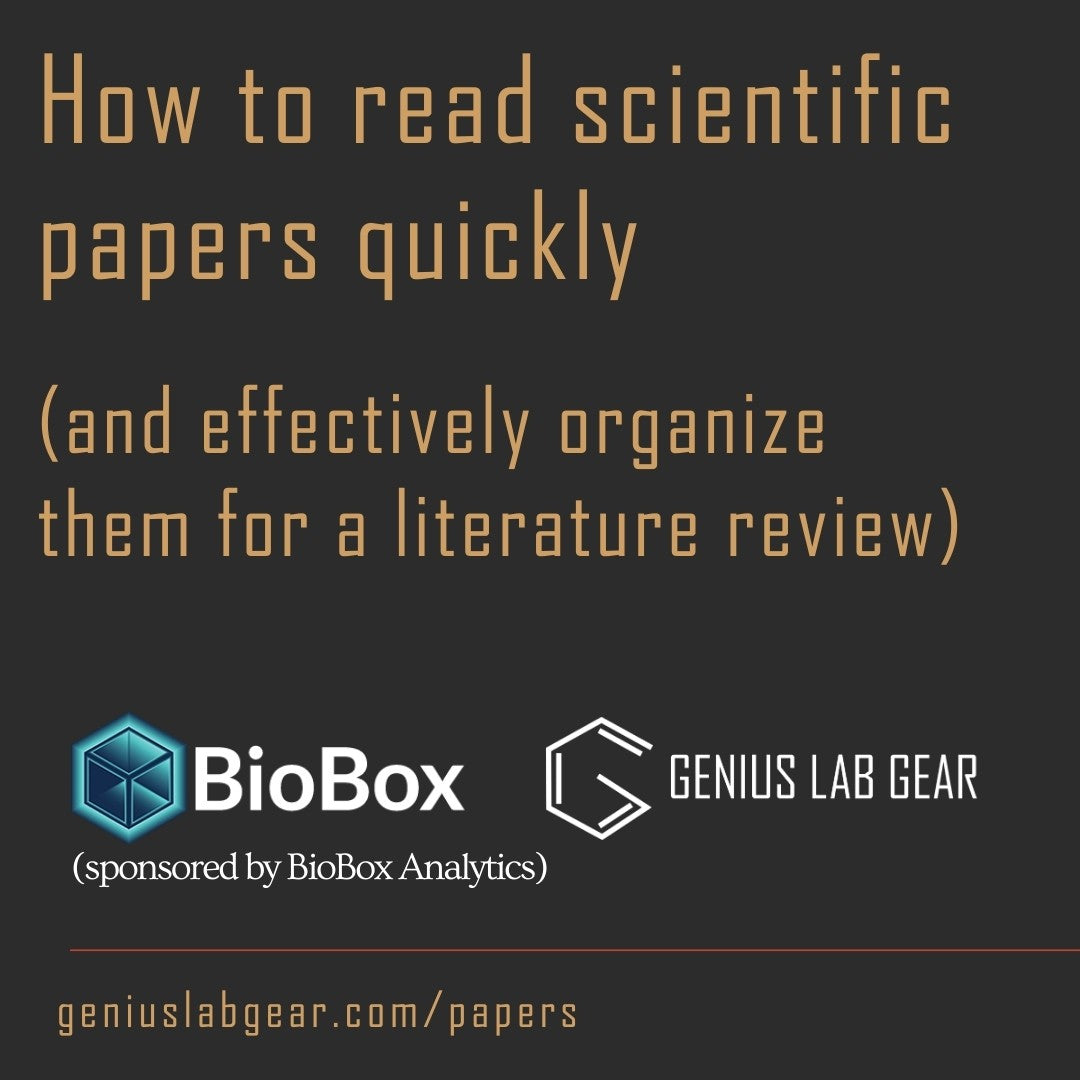
- How to read scientific papers quickly (and effectively organize them for a literature review)
10 min read
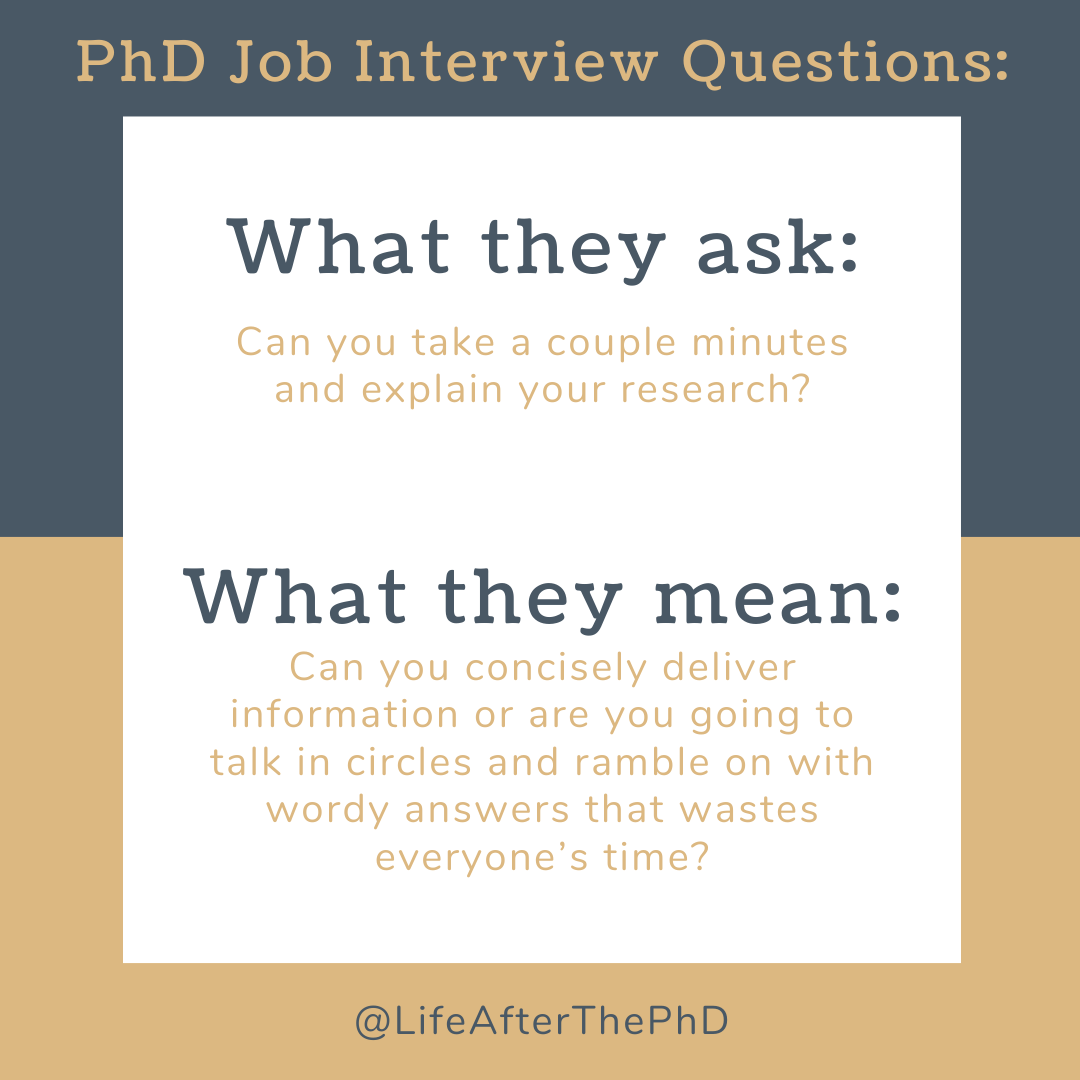
- 8 PhD Job Interview Questions: What They Ask vs. What They Mean
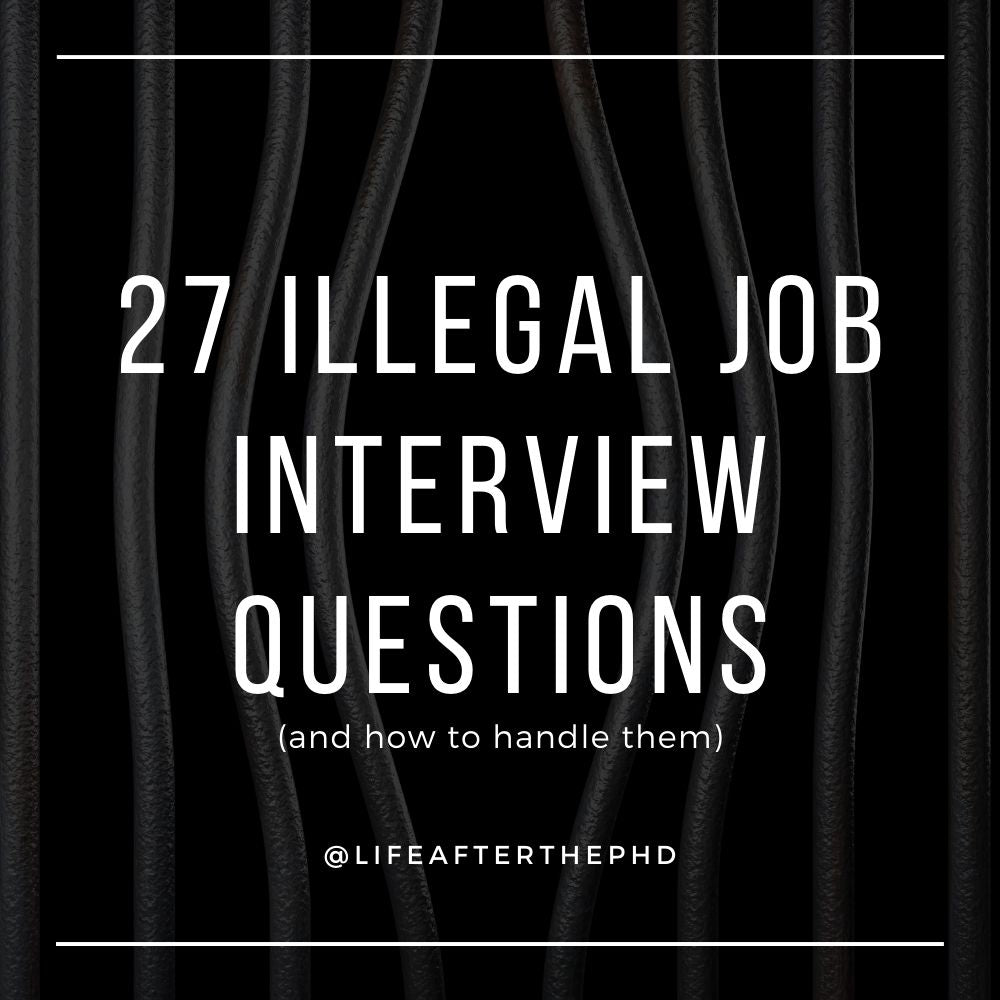
- 27 ILLEGAL Interview Questions to Know Before Your PhD Job Interview
Recent Articles
- How I negotiated for an extra week (and a half!) of vacation at my first post-PhD research job
- Common pitfalls of PhD thesis writing and 17 tips to avoid them
STEM Gift Lists
Science Gifts Biology Gifts Microbiology Gifts Neuroscience Gifts Geology Gifts Ecology Gifts
Stay up to date
Drop your email to receive new product launches, subscriber-only discounts and helpful new STEM resources.
Gifts for PhD Students, Post-docs & Professors

Sign up to get the latest on sales, new releases and more …
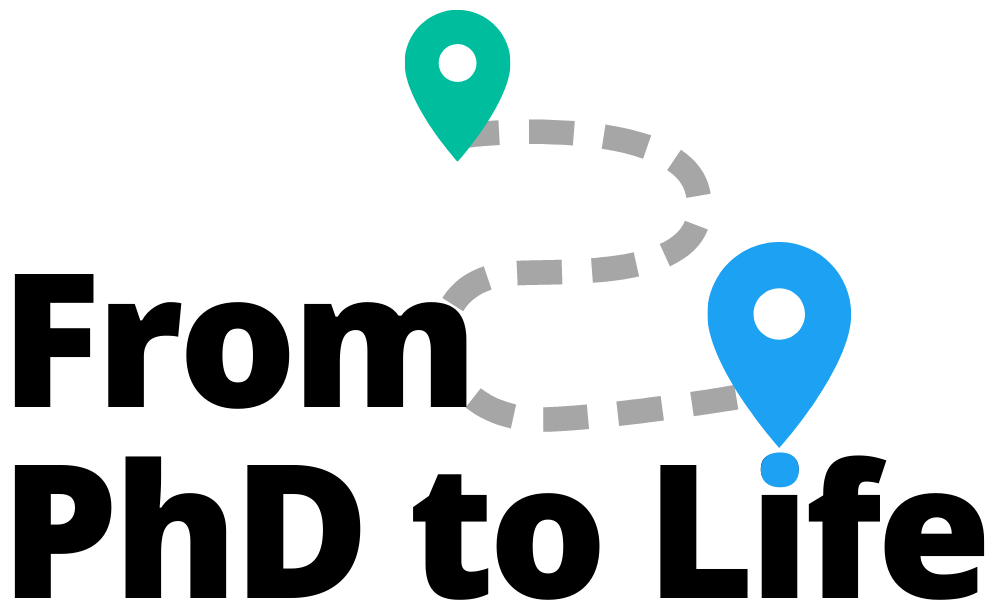
Recommended Reading

Note: As an Amazon Associate, I earn from qualifying purchases. In other words, I may earn a small commission if you click on a link on this page to purchase a book from Amazon.
This list is aimed at graduate students, postdocs, and other PhDs who are actively looking for paid employment or exploring career options. It includes both practical resources, books that combine advice with inspiration, ones that hope to advocate for better systems while also breaking things down for job seekers, as well as memoirs and novels. The focus here is on books written for graduate students and PhDs, but I’ve also included what I think as key or otherwise useful texts with a much broader intended audience.
What’s not on this list? Books that focus almost exclusively on graduate school itself are generally omitted (exception: Berdahl and Malloy, for its framing of the whole thing as part of your career). There are great ones in this category, including Jessica McCrory Calarco’s A Field Guide to Grad School , Malika Grayson’s Hooded: A Black Girl’s Guide to the Ph.D. , Robert L. Peters’s Getting What You Came For and Adam Ruben’s Surviving Your Stupid, Stupid Decision to go to Grad School . See also Gavin Brown’s How to Get Your PhD: A Handbook for the Journey , which features an essay by me! Similarly, books that focus on academic careers (once you’ve got one) aren’t included (example: Timothy M. Sibbald and Victoria Handford, eds., The Academic Gateway ), nor are books that focus on navigating a career beyond the ivory tower. There are lots of books about academic writing and publishing, conducting and producing research, doing a dissertation, and related stuff. These aren’t included either.
Something missing? I occasionally update this list, so let me know what you think I should add or change.
Books for PhDs
This list is in alphabetical order by author’s last name. Some of these books are inexpensive; others are not. Most should be available via your university or local library, or even from your institution’s career services centre.
Fawzi Abou-Chahine, A Jobseeker’s Diary: Unlocking Employment Secrets (2021).
The short guide is directly aimed at PhDs, especially folks from STEM disciplines. Folks in the UK seeking roles in the private sector will certainly benefit from this book.
Susan Basalla and Maggie Debelius, “ So What Are You Going to Do with That?” Finding Careers Outside Academia (3rd ed., 2014)
The best guide to figuring out your life post-PhD written by two humanities doctorates who’ve been there, done that. Includes many profiles of fellow (former) academics who’ve transitioned to careers beyond the tenure-track.
Loleen Berdahl and Jonathan Mallow, Work Your Career: Get What You Want from Your Social Sciences or Humanities PhD (2018).
I loved the authors’ emphasis on getting clear about what you want, and the advice to reflect at each stage of the graduate school process whether continuing on is the right one. It is refreshing to read a book on graduate school that neither presumes academia is the desired career outcome nor implies it ought to be. Instead, the authors encourage readers to keep their options open and rightly point out the benefits of varied work experience, training, and professionalism to careers within and beyond the Ivory Tower.
Natalia Bielczyk, What Is Out There for Me? The Landscape of Post-PhD Career Tracks (2nd ed., 2020).
A Europe-based computational scientist turned entrepreneur, Dr. Bielczyk offers an important perspective on PhD careers, one explicitly aimed at STEM folks. The book benefits from Bileczyk’s personal experiences, extensive research — including interviews with dozens of PhDs — and includes lots of specific advice and suggestions. You can subscribe to her YouTube channel and interact with her on social media.
Jenny Blake, Pivot: The Only Move That Matters Is Your Next One (2017)
From the description: “ What’s next? is a question we all have to ask and answer more frequently in an economy where the average job tenure is only four years, roles change constantly even within that time, and smart, motivated people find themselves hitting professional plateaus. But how do you evaluate options and move forward without getting stuck?”
Richard N. Bolles with Katharine Brooks, What Color is Your Parachute? 2021 : Your Guide to a Lifetime of Meaningful Work and Career Success (50th anniv. ed, 2020)
If you read only one book on how to get a job and change careers, make it this one. Bolles has an idiosyncratic writing style but his advice is spot-on. Read my review of the 2019 version here .
The 2021 edition was thoroughly updated by Katharine Brooks, EdD, who is the author of You Majored in What? (below). Great choice! An excellent way to bring a classic up to date, and at a time when good advice and guidance is particularly needed.
William Bridges, Transitions: Making Sense of Life’s Changes (40th anniv. ed., 2019)
Think you’re taking too long figuring out what’s next? You aren’t! In the pre-modern world, the transition—a psychological process as opposed to simply a change—was understood as a crucial part of life; not so nowadays. But to successfully navigate a transition, an individual has to experience an end, go through a period of nothingness or neutrality, and finally make a new beginning. No part of the process can be skipped or sped through. There are no shortcuts. (Bridges can relate to being post-PhD or on the alt-ac track: He’s got an ivy league PhD and was an English professor until going through an important transition of his own.)
Katharine Brooks, You Majored in What? Designing Your Path from College to Career (updated, 2017)
Dr. Brooks is a long-time career educator who (as of 2020) directs the career center at Vanderbilt University. This book is aimed at a broader audience of students, but don’t let that dissuade you from checking it out. Starting from the assumption that there are plenty of useful clues in what you’ve done and who you are, and filled with great exercises to help you parse them out, the book will take you through the career exploration process and set you up for a successful job search that is based on a sound understanding of what you want to do and how to make a strong case to employers.
Bill Burnett and Dave Evans, Designing Your Life: How to Build a Well-lived, Joyful Life (2016)
From the description: “In this book, Bill Burnett and Dave Evans show us how design thinking can help us create a life that is both meaningful and fulfilling, regardless of who or where we are, what we do or have done for a living, or how young or old we are. The same design thinking responsible for amazing technology, products, and spaces can be used to design and build your career and your life, a life of fulfillment and joy, constantly creative and productive, one that always holds the possibility of surprise.”
Christopher L. Caterine, Leaving Academia: A Practical Guide (2020)
Just published. Dr. Caterine is a classics PhD who transitioned into a career in strategic corporate communications. One thing that’s cool about this book is just that: He’s working in the private sector. Humanities PhDs are much less commonly found in the business world compared to academics with other backgrounds, and I think that’s a shame. Chris shows us it’s possible and how you can do it too. (But it’s fine if you’re looking elsewhere.)
Christopher Cornthwaite, Doctoring: Building a Life With a PhD (2020)
Dr. Cornthwaite is the Canadian religious studies PhD behind the blog and online community called Roostervane . He shares his story in hopes of inspiring those struggling to move forward with hope and strategies to build a career. Check out the online community too, useful for folks searching for non-academic positions as well as individuals launching side hustles or businesses as consultants of various kinds.
Leon F. Garcia Corona and Kathleen Wiens, eds., Voices of the Field: Pathways in Public Ethnomusicology (2021)
A friend of mine contributed a chapter to this. From the description: “These essays capture years of experience of fourteen scholars who have simultaneously navigated the worlds within and outside of academia, sharing valuable lessons often missing in ethnomusicological training. Power and organizational structures, marketing, content management and production are among the themes explored as an extension and re-evaluation of what constitutes the field of/in ethnomusicology. Many of the authors in this volume share how to successfully acquire funding for a project, while others illustrate how to navigate non-academic workplaces, and yet others share perspectives on reconciling business-like mindsets with humanistic goals.”
M.P. Fedunkiw, A Degree in Futility (2014)
I started to read this novel one day and just couldn’t stop until I finished. So many feelings! The main character defends her dissertation (history of science, U of T) at the beginning of the book, and the story ends a few years later. Fedunkiw has drawn on her own post-PhD experiences to write this wonderful book about a group of three friends navigating life, love, and work in and out of academia. Do read it.
Joseph Fruscione and Kelly J. Baker, eds., Succeeding Outside the Academy: Career Paths beyond the Humanities, Social Sciences, and STEM (2018)
Edited volume of contributions, primarily from women in humanities and social science fields. From the description: “Their accounts afford readers a firsthand view of what it takes to transition from professor to professional. They also give plenty of practical advice, along with hard-won insights into what making a move beyond the academy might entail—emotionally, intellectually, and, not least, financially. Imparting what they wish they’d known during their PhDs, these writers aim to spare those who follow in their uncertain footsteps. Together their essays point the way out of the ‘tenure track or bust’ mindset and toward a world of different but no less rewarding possibilities.”
Patrick Gallagher and Ashleigh Gallagher, The Portable PhD: Taking Your Psychology Career Beyond Academia (2020)
From the description: “Each chapter in this book offers tips and key terms for navigating various kinds of employment, as well as simple action steps for communicating your talents to hiring managers. Your ability to conduct research, to understand statistics and perform data analysis, and to perform technical or scientific writing are all highly valuable skills, as are the insights into human nature you’ve gained from your psychology studies, and your ability to think innovatively and work cooperatively in a variety of contexts.”
David M. Giltner, Turning Science into Things People Need (2017)
From the description: “In this book, ten respected scientists who have built successful careers in industry reveal new insights into how they made the transition from research scientist to industrial scientist or successful entrepreneur, serving as a guide to other scientists seeking to pursue a similar path. From the student preparing to transition into work in industry, to the scientist who is already working for a company, this book will show you how to sell your strengths and lead confidently.”
Alyssa Harad, Coming to My Senses: A Story of Perfume, Pleasure, and an Unlikely Bride (2012).
An English PhDs lovely memoir of discovering the wonders of perfume and embracing who she really is. A story of how one intellectual got back in touch with her feelings, a crucial step on the road to post-PhD happiness and fulfillment. Read an excerpt over at the Chronicle .
Leanne M. Horinko, Jordan M. Reed, James M. Van Wyck, The Reimagined PhD: Navigating 21st Century Humanities Education (2021).
This text appeals to both individual PhDs and graduate students figuring out their own pathway forward and faculty members and other university staff working to improve programs and professional development offerings at their campuses. I’m glad to see it out! (I was at the 2016 conference that inspired this book.)
Hillary Hutchinson and Mary Beth Averill, Scaling the Ivory Tower: Your Academic Job Search Workbook (2019)
Two long-time academic coaches wrote this fantastic guide and workbook for the academic job market. They take you step-by-step through the process of understanding how hiring works — and how it works differently for specific types of positions and kinds of institutions, getting sorted for your search, where to find job ads and other crucial information, staying organized, creating all your materials, prepping for interviews, and other considerations. The book also takes a clear-eyed view of academia and it’s challenges for job seekers, both in the US and around the world. This book is an essential companion to your academic job search. Buying the e-book version? Download and print the worksheets here .
Natalie Jackson, ed., Non-Academic Careers for Quantitative Social Scientists: A Practical Guide to Maximizing Your Skills and Opportunitie s (2023).
If you’re at an institution, check to see if you have free access to this ebook via Springer.
Kaaren Janssen and Richard Sever, eds., Career Options for Biomedical Scientists (2014).
From the description: “This book plugs the gap by providing information about a wide variety of different careers that individuals with a PhD in the life sciences can pursue. Covering everything from science writing and grant administration to patent law and management consultancy, the book includes firsthand accounts of what the jobs are like, the skills required, and advice on how to get a foot in the door. It will be a valuable resource for all life scientists considering their career options and laboratory heads who want to give career advice to their students and postdocs.”
Karen Kelsky, The Professor Is In: The Essential Guide to Turning Your Ph.D. Into A Job (2015)
Dr. Kelsky is dedicated to telling the truth about the academic job market. This book expands on and collects in one place her huge archive of advice and information for PhDs — particularly those aiming for tenure-track positions at US universities. There is advice and resources for “leaving the cult” (part X), a section heading that gives you a sense of where she’s coming from! Academic is its own beast, and its idiosyncracies and unwritten, untold norms and rules belie claims of meritocracy. If you’re going to aim for a tenure-track position, make sure you know what you’re going into and how to increase your chances of success where positions are scarce.
Peggy Klaus, Brag: The Art of Tooting Your Own Horn without Blowing It (2004)
In my experience, PhDs are excellent at not tooting their own horns, for lots of reasons, good and less-good. Here’s how you can talk about yourself appropriately in hopes of moving forward in your career. Great book.
Kathryn E. Linder, Kevin Kelly, and Thomas J. Tobin, Going Alt-Ac: A Guide to Alternative Academic Careers (2020).
If you’re doing or have a doctorate and want to be meaningfully employed in or around higher education, you must read this book – and do what it says. It’s full of clear, practical advice and example jobs where PhDs excel. I was impressed with the depth of knowledge and wide-ranging, thoughtful advice presented, useful for career explorers and seasoned professionals both (and everyone in between). It it’s been a while since you’ve taken a long, hard look at your professional situation, this book will help you revisit your goals and provide smart strategies to move your career forward in just the right way for you.
Kathleen Miller et al. (eds), Moving On: Essays on the Aftermath of Leaving Academia (2014)
Featuring an essay by your truly and many other contributions. By the women behind the now-defunct site How to Leave Academia.
Rachel Neff, Chasing Chickens: When Life after Higher Education Doesn’t Go the Way You Planned (2019)
From the description: “So, you have your PhD, the academic world’s your oyster, but teaching jobs, it turns out, are as rare as pearls. Take it from someone who’s been there: your disappointment, approached from a different angle, becomes opportunity. Marshaling hard-earned wisdom tempered with a gentle wit, Rachel Neff brings her own experiences to bear on the problems facing so many frustrated exiles from the groves of academe: how to turn ‘This wasn’t the plan!’ into ‘Why not?’”
M. R. Nelson, Navigating the Path to Industry: A Hiring Manager’s Advice for Academics Looking for a Job in Industry (2014)
Melanie Nelson’s useful guide is aimed at STEM PhDs who already know where they’re headed. She earned a PhD in the biosciences and has worked as a hiring manager in industry for over a decade.
Rebecca Peabody, The Unruly PhD: Doubts, Detours, Departures, and Other Success Stories (2014)
A collection of first-hand accounts and interviews with people who’ve travelled in, through, and beyond graduate school. Read my review here .
Katie Rose Guest Pryal, The Freelance Academic: Transform Your Creative Life and Career (2019).
Read this book! Katie Pryal provides helpful advice for getting started with the practical stuff, as well as grounding yourself in the reality of the gig economy. It’s particularly good for arts and humanities PhDs and similar academically-focused folks who think business isn’t for them. Take it from Dr. Pryal (and me): You can do this.
Tom Rath, StrengthsFinder 2.0: Discover Your CliftonStrengths (2017)
Take this one out of your local library to read the descriptions and learn about the concept of (work) strengths. If you want to take the assessment, you can purchase the book outright or do that on Gallup’s website . If you’re newer to the world of work beyond the academy, this book and the description of strengths will give you all kinds of useful words and phrases to use to understand what you enjoy, what you bring to a workplace, and effectively communicate all that to potential employers and professional colleagues. Embracing strengths will give you a positive, forward-looking way of approaching career building, and it can change your life for the better.
Katine L. Rogers, Putting the Humanities PhD to Work: Thriving in and beyond the Classroom (2020)
From the introduction: “This book invites readers to consider ways that humanities graduate training can open unexpected doors that lead to meaningful careers with significant public impact, while also suggesting that an expanded understanding of scholarly success can foster more equitable and inclusive systems in and around the academy.” Good. Do read this one if you’re currently a student or if your work has anything to do with advising students or creating and maintaining the graduate training ecosystem within and beyond institutions.
Martin E. P. Seligman, Flourish: A Visionary New Understanding of Happiness and Well-being (2011)
An update to his bestselling book Authentic Happiness (also worth reading), this introduced me to the concept of PERMA: that to flourish in life and work, you need to consider and evaluate how frequently you experience have positive emotions (P), feel engaged (E), have positive relationships (R), feel what you’re doing is meaningful (M), and have a sense of accomplishment (A). This isn’t about careers specifically, but it might help you reframe what counts as success in your work life, and that’s particularly crucial for career changers.
Melanie V. Sinche, Next Gen PhD: A Guide to Career Paths in Science (2016)
From the description: “Next Gen PhD provides a frank and up-to-date assessment of the current career landscape facing science PhDs. Nonfaculty careers once considered Plan B are now preferred by the majority of degree holders, says Melanie Sinche. An upper-level science degree is a prized asset in the eyes of many employers, and a majority of science PhDs build rewarding careers both inside and outside the university. A certified career counselor with extensive experience working with graduate students and postdocs, Sinche offers step-by-step guidance through the career development process: identifying personal strengths and interests, building work experience and effective networks, assembling job applications, and learning tactics for interviewing and negotiating—all the essentials for making a successful career transition.”
Don. J. Snyder, The Cliff Walk: A Memoir of a Job Lost and a Life Found (1998)
A marvelous memoir written by a former tenure-track professor at Colgate University who was suddenly let go. This is the story of his journey through unemployment. You will relate. What’s neat is to look up what he does now — but do read the book before you do! I quote from the book in this post .
Matteo Tardelli, Beyond Academia: Stories and Strategies for PhDs Making the Leap to Industry (2023)
This book takes readers through a 4-step process to reflect on what they want, explore job options, apply for roles, and conduct job interviews and negotiate offers. This is Dr. Tardelli’s second book for PhDs moving to non-academic careers; his first one is partly a memoir about his own journey: The Salmon Leap for PhDs (2020).
Anna Marie Trester, Bringing Linguistics to Work: A Story Listening, Story Finding, and Story Telling Approach to Your Career (2017)
My friend and colleagues Dr. Anna Marie Trester is the expert on careers for linguists, and more broadly is a great resource for thinking creatively and expansively about the value of your social sciences and humanities education to the wider world of work and career development. Check out her website for more offerings, CareerLinguist.com .
Jennifer Brown Urban and Miriam R. Linver, eds., Building a Career Outside Academia: A Guide for Doctoral Students in the Behavioral and Social Sciences (2019)
From the description: “This career guide examines the rewarding opportunities that await social and behavioral science doctorates in nonacademic sectors, including government, consulting, think tanks, for-profit corporations, and nonprofit associations. Chapters offers tips for leveraging support from mentors, conducting job searches, marketing your degree and skill set, networking, and preparing for interviews. This expert guidance will help you decide what career is the best fit for you.”
Julia Miller Vick, Jennifer S. Furlong, and Rosanne Lurie, The Academic Job Search Handbook (5th ed., 2016)
Pick this one up for trustworthy job market advice and info — the first edition was published in 1992! — and the dozens of sample cover letters, CVs, and statements of various kinds. It covers an array of fields, from professionally-oriented doctorates to STEM and humanities. This book is a beast, and might be overwhelming. Tackle it bit by bit and keep it as a reference as you gear up for the job market, prepare and submit applications, and move along the hiring process toward negotiation and acceptance.
Susan Britton Whitcomb, Resume Magic: Trade Secrets of a Professional Resume Writer (4th ed., 2010)
This was the book I found most useful when I was researching how to write a good resume (as opposed to an academic CV).
- Our Top Books for PhD Students

There are a lot of books out there targeted at PhD students. But how do you know which ones are worth your time? Really, most of them are probably worth your time, but we’ve picked out some top contenders.
Whether you’re looking for writing advice, want to learn how to be more productive or just searching for something humorous and relatable, we’ve narrowed down the best of the best!
*Every book on this list has above a four-star rating on both Amazon and Goodreads at the time of writing this article.
For building a writing habit. . .
We recommend you check out How to Write a Lot: A Practical Guide to Productive Academic Writing by Paul J. Silvia.
This book has been on recommendation lists since it was first published in 2007 and has continued to impress. Silvia offers his advice on conquering writer’s block, poor time management and other bad writing habits. As it’s written broadly, the advice is applicable to pretty much all subjects. The revised edition even includes a chapter on grant writing and fellowship proposals – perfect if you’re looking for PhD funding!
It’s safe to say this book has helped a lot of PhD students overcome their writing struggles.
For writing better. . .
We think you should pick up Stylish Academic Writing by Helen Sword.
A lesser known book, this has reached our list for its broad and creative approach.
Targeted at academics in general, Helen Sword dispels the myth that academic writing has to be dense and wordy. As she investigates the best academic writers across multiple disciplines, she looks at what makes their work stylish. Covering how to write interesting titles and engaging structure, this book will give you a range of techniques that could improve your writing style.
Also included are tips and anecdotes from a range of scholars across the Sciences, Social Sciences and Arts and Humanities.
To find motivation and build productivity. . .
Have a look at the increasingly popular The Dissertation Warrior by Guy E. White.
Guy E. White takes dissertation advice to the next level. Instead of teaching you how to write, The Dissertation Warrior will teach you how to become a person who finishes.
Whether you’re studying the Sciences, Humanities or anything in between, the biggest hurdle for PhD students is the final dissertation . Starting such a big task and maintaining a level of productivity can be extremely difficult. This book tackles the issue of motivation by looking at building passion and limiting procrastination. It also has chapters dedicated to tackling different parts of the dissertation, such as the introduction and methodology.
For more STEM-specific advice. . .
Pick up a copy of Writing Science: How to Write Papers that get Cited and Proposals that get Funded by Joshua Schimel.
It’s a common myth that those studying the Sciences don’t need to learn to write. But that couldn’t be further from the truth! So we’ve included a more specific option to show that skilful writing in STEM subjects is equally important.
Joshua Schimel’s popular guide details how to write clearly and engagingly for any professional audience. Diving deep into the importance of flow and structure, Schimel teaches you how to write papers, proposals and grants.
For passing the viva. . .
Take a look at The PhD Viva: How to Prepare for Your Oral Examination by Peter Smith.
There are lots of great books out there about the viva . However, Peter Smith’s extensive experience puts his at the top of our list. Having sat in over 100 viva examinations as a chair, examiner and supervisor in a range of subjects it’s safe to say that Smith knows what he’s talking about.
This well received book will help you understand what the viva is all about and how to prepare for it. The mix of useful advice, illustrative examples and activities for the reader should help instil you with confidence for the big day.
One final notable mention. . .
Not technically a book, but we recommend you check out the website PhD Comics .
This webcomic series is written by postgraduate students who document their incredibly relatable lives. If you’re looking to find a bit of solace and humour in some of the more challenging parts of PhD study, then you’ll find it here.
Our postgrad newsletter shares courses, funding news, stories and advice
You may also like....
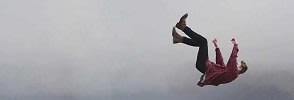
PhD pitfalls - (some of) the things that actually do go wrong
It isn't always the big challenges that cause problems. Here are some of the less obvious (but no less significant) risks to research success.

What makes a successful PhD?
From the right mentality to a good idea, we've collected a number of things you're going to need to succeed in your PhD.

Video: maintaining a healthy work-life balance during my PhD
Maria is FindAPhD's student ambassador. Let her share her tips to look after your health and wellbeing during your PhD.
FindAPhD. Copyright 2005-2024 All rights reserved.
Unknown ( change )
Have you got time to answer some quick questions about PhD study?
Select your nearest city
You haven’t completed your profile yet. To get the most out of FindAPhD, finish your profile and receive these benefits:
- Monthly chance to win one of ten £10 Amazon vouchers ; winners will be notified every month.*
- The latest PhD projects delivered straight to your inbox
- Access to our £6,000 scholarship competition
- Weekly newsletter with funding opportunities, research proposal tips and much more
- Early access to our physical and virtual postgraduate study fairs
Or begin browsing FindAPhD.com
or begin browsing FindAPhD.com
*Offer only available for the duration of your active subscription, and subject to change. You MUST claim your prize within 72 hours, if not we will redraw.

Do you want hassle-free information and advice?
Create your FindAPhD account and sign up to our newsletter:
- Find out about funding opportunities and application tips
- Receive weekly advice, student stories and the latest PhD news
- Hear about our upcoming study fairs
- Save your favourite projects, track enquiries and get personalised subject updates

The 7 Books Every PhD Student Should Read
By alex wakeman.
Let’s be honest. If you’re nerdy enough to be doing a PhD, you probably love a good book. Whether you’re looking for entertainment or advice, distraction or comfort, the seven listed here can each, in their own way, help you through your frustrating but uniquely rewarding life of a PhD student.
- Isaac Asimov – I, Robot
“1) A robot may not injure a human being or, through inaction, allow a human being to come to harm.
2) A robot must obey the orders given it by human beings except where such orders would conflict with the First Law.
3) A robot must protect its own existence as long as such protection does not conflict with the First or Second Law.”
The Three Laws of Robotics. Simple. Elegant. Watertight. What could go wrong? These three, now legendary rules are printed on the first page of ‘I, Robot’ then are immediately followed by a series of masterful short stories in which Asimov dismantles his seemingly perfect creation before your very eyes. With ‘I, Robot’ (and many of his other works) Asimov displays dozens of ways rules can be bent and circumvented. As it turns out, a lot can go wrong.
In some ways, this collection of short stories about misbehaving robots acts as a training manual for one of the most essential skills any PhD student must develop: discerning truth. Has that experiment proved what you think it proves? To what extent does it prove that? Are you sure? You might be convinced, but will everyone else at the conference see it that way? At first glance, Asimov’s Three Laws seem like a pretty good crack at a clear and concise system to prevent anything from quirky, metallic shenanigans to an anti-organic apocalypse. Are you sure about that? Look at them again, have a think, test them as vigorously as you would any real-world proof. Then go and read ‘I, Robot’ and find out how wrong you were.
- Sayaka Murata – Convenience Store Woman
You could probably be doing something better with your life, you know. Most people doing a PhD are a pretty effective combination of intelligent and driven. You almost certainly got a 1 st or a 2:1 in a bachelor’s degree, probably a masters. Someone with this profile could certainly find a career with a starting salary above the RCUK minimum stipend level of £15,285 a year, likely one with a much more concrete future ahead of them as well. For most people it doesn’t make a lot of sense to do a PhD; it’s a huge investment of time and energy directed towards a very specialised end. But there are plenty of good reasons to do one as well and if you’re currently working on a PhD you are probably (I sincerely hope) aware of one of the main ones: it’s fun. It really can be fun, at least for a very peculiar type of person. But, of course, it’s not a particularly normal idea of fun. Most people have had their fill of learning by the end of school, or at most university, and it can sometimes be tough convincing a partner or family member that this genuinely is what you enjoy, despite the dark rings they’ve noticed forming under your eyes.
Keiko would probably understand. She feels a very similar way. Not about PhDs or learning, making novel discoveries, or changing the world for the better; but she does feel a very similar way about her work in a convenience store. She enjoys everything about the convenience store, from the artificial 24/7 light to the starchy slightly ill-fitting uniforms, it provides her with enough money for rent and food and she wants for little else. Murata presents us with a tender and often hilarious portrait of a woman attempting to claim agency over her own, unique way of living, and convince others of the simple joy it brings her. If the average PhD student is twice as strange as your typical person, then as a PhD student you have twice as much reason to follow this proudly comforting story of an atypical person and her atypical interest.
- Viktor Frankl – Man’s Search for Meaning
Suffering is relative. It is certain that I will struggle with my PhD. I am still in the early days of my studies, but I am aware that studying for a PhD is likely going to be the hardest thing I have done with my life so far. In all the interviews I had for various funding schemes and DTPs, not one failed to ask a question that amounted to: “How will you cope?”. But at its worst my PhD still won’t cause me to suffer nearly as much as Viktor Frankl did. Don’t think I’m recommending this book to remind you to ‘count yourself lucky’, or any similar nonsense; Frankl isn’t concerned with pity, or one upping your struggles, he just wants you to feel fulfilled, even in the worst moments when nothing’s going right and you’re starting to doubt if you’re even capable of completing a PhD.
The first half of ‘Man’s Search for Meaning’ is a stark, sometimes unpleasant autobiographical account of Frankl’s time imprisoned in various Nazi concentration camps. But the difficulty of the subject matter is worth it for the fascinatingly unique perspective of the author: Viktor Frankl was one of the 20 th Century’s foremost neurologists. The first-hand experience of one of Europe’s blackest events – viewed through the lens of a Jewish psychiatrist – could quite easily paint a rather bleak and hopeless image of humanity. This, however, is not the case. Instead, Frankl uses the second half of the book to explain in layman’s terms the psychological basis behind his biggest contribution to his field: Logotherapy. Frankl emerges from the immense suffering of the holocaust to clearly and kindly encourage us to find meaning and joy in all parts of life. Far from being a depressing read ‘Man’s Search for Meaning’ is instead likely to leave you feeling inspired, cared for, and capable of getting through whatever nonsensical data, failed experiments, and frustrating failures your PhD might throw at you.
- John Ratey – Spark!
We’ve all had times in our lives when we felt that we couldn’t afford to exercise, when life is just so overwhelmingly occupied, there’s too many important things going on. At some points in your PhD, when you feel too busy to take a break, see friends, or cook a proper dinner, having a go at the ‘Couch to 5k’ certainly doesn’t look like it’ll be getting any of your valuable hours any time soon. But after several decades of researching the human brain, Professor John Ratey is here to argue that you can’t afford not to exercise.
I’m sure it isn’t a great revelation to you that exercise is vital for your physical health, but ‘Spark!’ instead implores us to think of exercise as an essential activity for our brain. With an abundance of examples from modern publications in psychiatry and neuroscience, Ratey explains the effects of regular exercise on the human brain. Better memory, improved problem solving, better pattern recognition, longer periods of focus, reduced procrastination and improved mood; I struggle to believe there’s a single human being who would not benefit from every one of these and the countless other benefits discussed throughout the book. But for PhD students, whose work is especially dependent on the functioning of their brain, the effects are potentially even more transformative. You wouldn’t dream of mistreating the expensive lab microscope. You’d never work with equipment that had been left dysfunctional due to lack of care: why treat your own brain any differently?
- Hermann Hesse – The Glass Bead Game
PhD students are students. Sometimes this is painfully clear, sometimes it is easy to forget. But nevertheless, learning is at the centre of a PhD and learning is a two way-street. There is no learning without teaching, even if the learner and the teacher are the same person. ‘The Glass Bead Game’ is a novel about learning and teaching, it is a realistic portrait of two sides of the same coin, simultaneously superimposed upon one another.
The story takes place in an imaginary European province in which experts, scientists, scholars, and philosophers are allotted unlimited resources and are permitted to follow any interest or whim to their heart’s content. In many ways this place may sound utopian compared to the current state of academia, so ruthless in its limitation of funding, and so stringent in its selection processes. Yet this is not a utopian novel. But neither is it a dystopian one. Hesse somehow manages to create a world that feels genuine and authentic, despite its fantastical premise. Though he uses the extreme concept of a country entirely focused on pedagogy to explore the nature of learning, this extremity never becomes fanciful with regards to the positives and negatives of such a way of living. Rather than leaving the reader with a melancholic longing for a fantasy world where the streets are paved with postdoc positions, the realism of ‘The Glass Bead Game’ is more likely to help you find a balanced appreciation for life in academia, better able to accept it’s many blemishes, and in doing so more able to appreciate it’s many joys.
- Plato – The Last Days of Socrates
A PhD is a doctor of philosophy. As PhD students we are all therefore philosophers-in-training. We are learning how to ask precise questions, and how to answer them in a convincing, conclusive manner. We are learning to fully understand the nature of evidence and proof, to recognise when something is proved and when it is not. The word itself comes from the Greek ‘philos’ (loving) and ‘sophia’ (wisdom), an apt description of anyone willing to spend several years of their life researching one extremely niche topic that few others know or care about.
Although the Classical philosophers arrived long before any concept of scientific method, and they often came to some conclusions that now seem laughable, a small understanding of their world can do a lot for any 21st century philosopher. This book in itself won’t come to any ground breaking conclusions that haven’t been long since disproved, or better communicated, but it’s place in this list is earned as an essential introduction to the history of asking questions. At a time in which more and more people are recoiling from the influence of experts, this story of a man being put on trial for asking too many questions remains as relevant as it was 2,000 years ago. And ultimately, this book would still earn its spot on this list solely as the source of the famous scene in which Socrates insists that the only reason the Oracle named him the wisest of the Greeks, was because he alone amongst the Greeks knows that he knows nothing – a statement that may haunt and comfort any PhD student, depending on the day.
- Walt Whitman – Leaves of Grass
Perhaps you’re wondering how a book of 19 th Century poetry is going to help you be a better PhD student. Unlike the other entries on this list, I will make no claim to its ability to help you think better, nor will it help you ask better questions, nor make you feel more justified in your choice of career path. ‘Leaves of Grass’ will not help you be a better PhD student in any way, because you are not a PhD student, you are a human being, and that’s enough. Not only is that enough, that’s everything. To Walt Whitman there’s nothing more you can be. It is quite easy for your view of the world (and therefore your place in it) to become narrowed. You spend all day working on your PhD. All, or most of your colleagues are doing the same, perhaps many of your friends as well. But your PhD is not your life. The success or failure of your research is not you. The accumulation of three Latin characters at the end of your name is not an indication of value. If you are to read any of the books that I have recommended here make it this one and there will be no problem over the coming years that you will not be prepared for, not because it will guarantee your success, but because it will assure you that whilst there are trees and birds and stars and sunlight there doesn’t need to be anything more – anything else that comes out of each day is a welcome (but unnecessary) add-on. Whatever happens during your PhD, whether your thesis changes the world, or all your plans come to nothing, or you drop out halfway through, or you take ten years to finish. Just be you, be alive, be human, and know that that’s more than enough.
Share this:
Published by Alex Wakeman
View all posts by Alex Wakeman
Leave a comment Cancel reply

- Already have a WordPress.com account? Log in now.
- Subscribe Subscribed
- Copy shortlink
- Report this content
- View post in Reader
- Manage subscriptions
- Collapse this bar
Home › 8 Essential Books All Graduate Students Should Read
8 Essential Books All Graduate Students Should Read

Some of the links in this post may be affiliate links. See our disclosure for more info.
We all know that graduation is an incredible rite of passage, but what if that isn’t the end of your academic career?
In the U.S.A, an estimated 5.5 million people hold a doctorate of some kind. That’s around 1.77% of the population, and I’m one of those people.
Even for the most passionate and organized student, studying for a PhD is a relentless, difficult, and lonely road.
It’s a decision that oftentimes cannot be understood by those who are close to us, with friends, family members, or people we meet on a daily basis, questioning why we on earth we would want to undertake yet another degree.
The pursuit of knowledge – the thirst to know more, to investigate the uninvestigated, and expand our horizons – keeps thousands of us going back to graduate school for more, every year.
Graduate school offers unparalleled opportunities for learning new skills (including languages), foreign travel, public speaking, teaching, and more.
For me? My genuine love of research and writing made the four years of my PhD some of the best of my life so far.
I’ve put together a definitive list of the most helpful and encouraging titles I encountered during my time at graduate school, mostly because I wish someone had been able to recommend them to me when I needed them.
So whether you’re just embarking on a PhD, or are almost ready to submit your thesis, check out these essential books graduate students should read.
Page Contents
1. One Hundred Semesters: My Adventures as Student, Professor, and University President, and What I Learned along the Way, William M. Chace
William Chace entered graduate school in English at the University of California at Berkeley in 1961.
He was just one of an astonishing 120 new students who embarked on graduate study that year – in his department alone. Among his cohort, however, just 12 students ended up receiving their PhD.
The professors who taught him were unsurprised that only 10% of the 1961 cohort actually completed their studies, a fact Chace puts down to their view of graduate school as a calling.
“Graduate students were being considered for membership in a secular priesthood,” he writes – and those of you who are already at graduate school today might empathize with his sentiments.

In One Hundred Semesters , Chace combines incisive analysis with his personal memoir to create a larger picture of the way American higher education has evolved during the past half century.
We journey with Chace through the decades of his own education, from his undergraduate degree at Haverford College; the boredom and confusion he felt as a graduate student during the Free Speech movement at Berkeley; a trip to jail following his support of his own students at a civil rights protest at Stillman College, Alabama; his days as a professor at Stanford; and his later appointment as president of both Wesleyan University and Emory University.
Chace’s memoir is born out of his own rich, varied, and incredibly complex experience; portraying the unique importance of the classroom with as much insight and vigor as the peculiar rituals, rewards, and difficulties of administrative office.
One Hundred Semesters is vital reading for students today, because it reminds us that although there is much to despair over (costs, underfunding, institutional marketing) the true purpose of higher education remains the same.
2. The Dissertation Warrior: The Ultimate Guide to Being the Kind of Person Who Finishes a Doctoral Dissertation or Thesis, Guy White
There are so, so many dissertation writing guides that I could’ve pointed you to here, but I also know it’s highly likely you’ve already found them on your own. So, I chose Guy White’s Dissertation Warrior instead, for several reasons.

Though the ‘classic’ guides like Destination Dissertation and Writing Your Dissertation in 15 Minutes a Day are still interesting and relevant, they have also become somewhat outdated.
In addition, the interactive, online only challenge of AcWriMo has essentially rendered the latter unnecessary.
But White’s book is different, because it reaffirms what I now know to be true: that doing a PhD is a transformative process that leads to being the best version of yourself, not about just finishing your thesis .
While he does talk about conquering your introduction (the hardest part!), creating alignment in your argument, and tackling the literature review, White goes far beyond providing tips for attacking the thesis.
He provides an important and much needed sense of perspective on the actual process of getting a PhD ; transforming yourself into a scholar with something to say, and maintaining your personal relationships along the way .
Though this book isn’t a dissertation how-to, it’s the perfect gift for a friend or relative who is about to embark on the PhD process.
It’s motivational yet realistic, and it’ll get anyone into the kind of mindset that’s necessary for getting through graduate school.
3. Getting What You Came For: The Smart Student’s Guide to Earning an M.A. or a Ph.D, Robert Peters
Some books are classics for a reason, and Getting What You Came For fits into that category nicely.
First published in 1997 and subsequently revised, you might find that some parts of this book – including an appendix on buying a computer – are a little irrelevant, but others are worth their weight in gold.

Unlike many other guides, it starts with the simple question: is graduate school right for you?
Should you get a Masters or PhD? How can you choose the right school? At almost 400 pages, this is a substantial book that covers all the bases, from selecting a school and applying, to defending your thesis, graduation, and beyond.
Based on interviews with career counsellors, graduate students, and professors, Getting What You Came For is full of real-life experiences that have, surprisingly, stood the test of time.
The experience of going to graduate school – from applying for grants and financial help to dealing with departmental politics – has actually changed very little in the last twenty years or so.
Don’t read Peters’ work if you’re looking for a reassuring, motivational title that will take you by the hand and tell you that everything is going to be OK.
Every chapter is a reminder of the commitment you’ve made – to yourself, your education, your supervisor, and your institution – and the hard work that will be necessary to graduate at the end of it.
Nonetheless, you’ll find some valuable insights to help you get what you came to graduate school for, no matter what you’re studying.
4. Playing the Game: The Streetsmart Guide to Graduate School, Frederick Frank & Karl Stein
If you’re looking for a realistic, down to brass tacks guide to going to graduate school, this is for you.
Both Frank and Stein graduated from prestigious doctoral programs, and used their combined experience in publishing, researching, conference presentations, doctoral committee service, consulting, grant writing, and teaching graduate school to write this no-nonsense guide.

One reviewer described Playing the Game as “lewd and rude,” but it’s also incredibly helpful and insightful.
It’s broken down into three sections: getting in, getting through, and getting the hell out. Whatever stage of the PhD process you’re at, you’ll find something relevant among the boys’ own brand of intelligent, humorous wisdom.
Frank and Stein simplify the process of getting into graduate school, translate the complex jargon you’re expected to know from day one, and impart a series of personal, relevant, but comedic stories based on their own experiences.
Personal experience has taught me that it’s easy to get caught up in, well, the game of graduate school, which encourages competitive spirit, unhealthy habits, and self-doubt.
Reading Playing the Game is a reminder that everyone working towards a PhD feels – and goes through – the same things, even if they are more successful at hiding it from other people.
When you’re knee deep in literature or trying to learn an entire semester’s worth of teaching material, this is welcome light relief.
I guarantee you’ll pick it up again and again during your graduate school journey, and find something of value every time.
5. How to Write a Lot: A Practical Guide to Productive Academic Writing, Paul J. Silvia
Whatever your discipline, one thing is for certain: if you’re studying for a PhD, you’re going to have to write – a lot .
The sheer volume of writing, as well as the many distractions we face along the way (teaching, conferences, and other commitments) can make it really difficult to fill our graduate school word quota.

Paul Silvia wrote his book – now in its second edition – in recognition of the fact that though all academics have to write, many struggle to finish their dissertations, articles, books, or grant proposals.
Writing is hard work and can be all consuming – surely there has to be a way to write and still have a life?
How to Write a Lot covers bad habits, common excuses, and practical strategies to help students, researchers, and professors become more prolific writers.
Silvia draws on his own experiences to explain how to write, submit, and revise academic work, without sacrificing your evenings, weekends, and vacations.
This edition has new sections on writing grant and fellowship proposals, which is helpful for post-doctoral researchers and early career fellows . It’s pretty much universally loved among academics of all ages, and it’s easy to see why.
How to Write a Lot is a really useful guide – probably the most useful on this list – wherever you are in your graduate school career.
At some point, everyone faces the infamous writers block, but reading this makes it both less likely that you’ll end up there, and more likely that you’ll break out of it faster.
It’s ideal for all PhD students, as his advice is universal and transcends disciplinary boundaries.
6. How to Read a Book: The Classic Guide to Intelligent Reading, Mortimer Adler & Charles Van Doren
Though graduate school is about finding your written voice and learning to articulate your own argument clearly, reading other people’s work is equally – if not, for a while, more – important.
The often dreaded literature review will form a crucial part of your thesis, as well as informing the other papers, talks, lectures, and proposals you write.

For that reason, the classic How to Read a Book is an important addition to this list. With over half a million copies in print, this is an enormously successful guide to why and how we should read books.
Originally published in 1940 by Adler, a philosopher, it was heavily revised in 1972 when editor Van Doren came on board.
Though it provides guidelines for critically good reading books of all types, the sections on analytical reading, speed reading, and extracting the author’s message from a given text are particularly useful to graduate students.
I’d argue that How to Read a Book is a must-read for anyone, but it’s especially important when you’re studying for a PhD.
You might think that writing and writing well is the skill you need to focus on honing during graduate school, but I’d argue that reading well is just as important. This isn’t a short book, but it’s something you can dip in and out of at will.
7. Teaching College: The Ultimate Guide to Lecturing, Presenting, and Engaging Students, Norman Eng
Whatever your course of study, chances are you’ll need to do some teaching at some point in your PhD. Presenting at conferences is also a vital method of disseminating your research, networking, and entering the job market – so it’s important that you can do it well.

Norman Eng is a Doctor of Education (Ed.D.) with a background in teaching and marketing. Working as a marketing executive, he realized that his clients needed to know and engage with their target audience in order to communicate effectively and be successful.
Eng then went on to be an elementary teacher, and was nominated as one of the Honor Roll’s Outstanding American Teachers in the mid 2000s.
Later a college professor, he found that much of his experience in marketing and elementary teaching held true for college instructors – that students, undergraduate or graduate, need to see the value of what you are teaching to their lives.
Teaching College is an approachable blueprint for learning the necessary graduate school skills of presenting, lecturing, teaching, and engaging students .
Eng’s goal is that adjunct professors, lecturers, assistant professors, and graduate assistants alike can learn effective teaching methods – and in that, he’s incredibly successful.
Whatever the level of the reader, Eng’s guide has been highly praised and recognized as a stellar resource. His practical tips and down-to-earth advice make this an excellent, approachable read, whether you currently have teaching experience or not.
8. The Professor Is In: The Essential Guide To Turning Your Ph.D. Into a Job, Karen Kelsky
I hate to say it, but the long and arduous journey of getting a PhD might be just the beginning. Sure, some people see getting a PhD as a personal academic challenge, but the vast majority go through graduate school with the aim of securing the job at the end of it.

As Kelsky tells us, “for every comfortably tenured professor or well-paid former academic, there are countless underpaid and overworked adjuncts, and many more who simply give up in frustration.” The small minority who don’t fall within these two groups have one thing in common: a plan.
The Professor Is In is a definitive guide to setting yourself up for success when you already have a PhD in hand.
Kelsky covers a myriad of valuable topics; providing the lowdown on academic job searches, the common mistakes made by unsuccessful applicants, and when and how to point your PhD to other, non-academic options.
This is a wonderful, non-judgemental book that is essential reading for new PhDs. Learn when, where and what to publish. Learn how to write a grant application; tips for job talks and campus interviews; creating the perfect Curriculum Vitae and more.
And if you don’t land the perfect tenure-track job, or become disenchanted with the process along the way?
Don’t worry about it. You aren’t alone, and there are many, many things you can do with a PhD outside academia. The Professor Is In and she is here to help!

I wrote this article to help students find the resources to support and encourage them on their journey through graduate school.
Doing so helped me to relive some of the many highlights – and low points – of the years I spent working towards my PhD . It remains one of my biggest achievements, and the thing I am most proud of.
Graduate school isn’t always easy, and sometimes you won’t see all the positives until the PhD is defended and done. But wherever you are now, good luck. And in case no-one else has told you this lately: what you are doing is relevant, your argument is valid, and you deserve to be right where you are.
It always seems impossible, until it’s done. Nelson Mandela
Natalie Seale
Leave a Comment Cancel reply
Save my name, email, and website in this browser for the next time I comment.
- Skip to primary navigation
- Skip to main content
- Skip to primary sidebar
- Skip to footer
Don't Miss a Post! Subscribe

- Book Summaries
- Books for Teachers
- Research Methodology Books
- Themed Book Lists
- Beyond Books

Selected Reads
A blog for bibliophiles covering everything related to books from reviews and summaries to quotes and open articles.
Best Dissertation Writing Books
By Med Kharbach, PhD | Published: June 18, 2023 | Updated: June 6, 2024
Dissertation writing books are the topic of our blog post today!
Embarking on a dissertation is a pivotal moment in any scholar’s academic journey, marking the culmination of years of study and research. It’s a daunting task, often filled with challenges that test even the most diligent of students. Recognizing the complexity and significance of this endeavor, I’ve compiled a list of essential books to aid you in your dissertation journey.
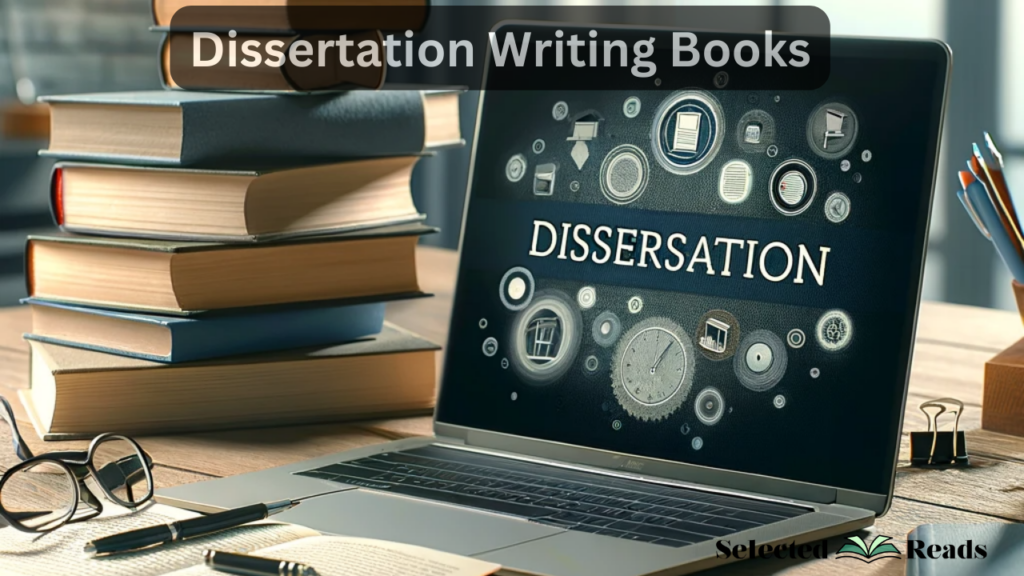
These dissertation writing books, carefully selected based on their practicality and insightful guidance, are invaluable resources for any PhD candidate. Whether you’re struggling with formulating your research question, navigating the intricacies of your methodology, or simply seeking to refine your writing skills, these books offer a wealth of knowledge and tips from seasoned academics.
In this post, we will delve into each of these books, exploring how they can ease the burden of dissertation writing and guide you towards successful completion of your academic milestone.
Related: Best Grant Writing Books
Dissertation Writing Books
Here are our top picks for dissertation writing books:
1. A Manual for Writers of Research Papers, Theses, and Dissertations , by Kate L. Turabian et al.

Turabian’s guide is a thorough exploration of the research and writing process, tackling each step with precision. The book expertly navigates Chicago’s two source citation styles and covers various facets of editorial style, including quotations and visual material.
Additionally, the manual offers practical solutions to overcoming the common fear of embarking on significant writing projects. An essential resource for anyone engaged in academic writing.
2. How to Write a Thesis , by Umberto Eco

Eco presents an invigorating approach to crafting a thesis. Divided into six integral sections, the book covers all facets of the thesis-writing process. It delves into defining and understanding the purpose of a thesis, selecting a compelling topic, conducting detailed research, crafting a work plan, the actual process of writing, and finally, refining the final draft. Eco’s lucid style and practical advice make this book a valuable guide for any student.
3. Writing Your Dissertation in Fifteen Minutes a Day , by Joan Bolker

Joan Bolker’s insightful book offers a much-needed support system for dissertation writers. A co-founder of the Harvard Writing Center, Bolker presents valuable tips and encouragement for graduate students to keep them focused and productive. She emphasizes the joy of devoting oneself to a truly engaging project and teaches strategies to overcome fear and improve writing style.
Related: Books on How to Write a Literature Review
4. How to Finish Your Dissertation in Six Months , by Scott Rank

Rank’s guide provides practical strategies to write a dissertation within a relatively short timeframe. The book shares an effective daily habit, tips on making consistent writing inevitable, managing incomplete research, leveraging advisor meetings, and seeking active help from friends. A game-changer for those struggling with time constraints in their doctoral journey.
5. The Dissertation Warrior , by Guy E. White

White’s book aims to inspire and guide doctoral students on their transformative journey. He addresses various aspects of dissertation writing and personal growth, focusing on efficient time management, aligning research and writing efforts, drafting an impactful introduction, and constructing a comprehensive literature review. A valuable guide that connects academic perseverance with personal development.
6. Authoring a PhD Thesis , by Patrick Dunleavy

Dunleavy’s comprehensive guidebook offers practical advice on formulating creative ideas, structuring them logically, drafting and revising text, and successfully completing a dissertation. It covers important aspects of the doctoral journey, such as facing examinations and getting work published. An essential resource for PhD candidates looking to effectively manage their work and intellectual challenges.
7. Getting the Best of Your Dissertation , by Dave Harris

Harris draws from multiple disciplines to provide a series of perspectives aimed at making your dissertation process more efficient and satisfying. The book delves into integrating dissertation work into your life, developing a productive writing practice, managing relationships with professors, designing research, and more. A comprehensive guide for achieving greater value from your doctoral journey.
8. Writing the Winning Thesis or Dissertation , by Randy L. Joyner, William A. Rouse, Allan A. Glatthorn

This book is a well-rounded resource for scholars seeking guidance in every phase of their research journey. The book provides insights on utilizing new technologies, effective planning, engaging writing style, defense preparation, and more. The updated fourth edition includes current case studies, which demonstrate the effectiveness of the teachings contained within.
9. How to Write a Lot: A Practical Guide to Productive Academic Writing , by Paul J. Silvia

Silvia provides strategies to dismantle common excuses and bad habits that hinder writing. His approach encompasses various academic disciplines and offers practical steps to motivate academics to be more prolific writers. The book discusses how to write, submit, and revise academic work, promoting a balanced work-life while achieving writing goals. The second edition includes an additional chapter on writing grant and fellowship proposals.
10. Writing for Social Scientists , by Howard S. Becker

Becker’s guide is a refreshing take on academic writing, emphasizing the importance of simply starting to write and then revise. It uncovers the eccentricities of academic writing, such as unnecessary wordiness and the passive voice, and provides practical solutions to overcome them. This is a must-read for writers aiming to improve their style and efficiency in academic writing.
11. The Elements of an Effective Dissertation and Thesis , by Raymond L. Calabrese

Calabrese offers a systematic guide to writing an impressive doctoral dissertation or a master’s thesis. The book breaks down the elements of the dissertation, providing detailed descriptions, definitions, and examples. The approach accommodates both quantitative and qualitative research methodologies, helping students understand what content to include and where it fits best.
12. Dissertation Without Tears , by Natalya Androsova

In this empowering guide, Androsova tackles the pressure and guilt associated with dissertation writing. The book offers tips to find joy and fulfillment in the writing process, stressing the importance of self-compassion. It debunks 58 myths about dissertation writing and replaces them with a healthy mindset that facilitates a smooth journey to the finish line.
13. Demystifying Dissertation Writing , by Peg Boyle Single

Single’s guide offers a straightforward and systematic process to dissertation writing. The book aims to enhance writing fluency and productivity, offering guidance on topic selection, planning, scheduling, and actual writing. It is especially beneficial for those who feel they aren’t receiving enough guidance and for those seeking to increase their writing productivity.
14. How to tame your PhD , by Inger Mewburn

Dr. Mewburn, founder of The Thesis Whisperer blog, shares practical strategies for efficient research and writing based on her own doctoral journey. The book consists of re-edited and expanded blog posts offering a wealth of advice on completing a PhD effectively. It is a companion guide that demystifies the PhD process and guides readers towards successful completion.
15. The Dissertation Journey , by Carol Roberts, Laura Hyatt

This guide is a comprehensive resource for developing and writing a quality dissertation. It provides updated coverage of conducting a literature review, harnessing technology for research, and using progress tracking tools. The guide is filled with sample forms, resource lists, and other user-friendly elements, making the dissertation journey smoother and more manageable.
Final thoughts
In conclusion, the PhD journey is an arduous yet transformative path that demands not only intellectual rigor but also emotional resilience. The experience, as I have personally navigated through its trials, offers profound personal growth and a deeper understanding of one’s field of study.
Facing the adversity of my mother’s illness amidst my PhD was a defining challenge, but it underscored the importance of a strong support system and the resilience needed to persevere. The selection of books I have shared in this post, each offering unique insights and practical advice on dissertation writing, represents a valuable resource for anyone embarking on or currently navigating this demanding academic endeavor.
These dissertation writing books, covering a wide range of topics from research methodology to time management and writing skills, can serve as essential tools to guide, inspire, and support PhD candidates through their journey, making the daunting task of dissertation writing more manageable and ultimately leading to successful completion and personal fulfillment.
Related Posts

Meet Med Kharbach, PhD
Dr. Med Kharbach is an influential voice in the global educational landscape, with an extensive background in educational studies and a decade-long experience as a K-12 teacher. Holding a Ph.D. from Mount Saint Vincent University in Halifax, Canada, he brings a unique perspective to the educational world by integrating his profound academic knowledge with his hands-on teaching experience. Dr. Kharbach's academic pursuits encompass curriculum studies, discourse analysis, language learning/teaching, language and identity, emerging literacies, educational technology, and research methodologies. His work has been presented at numerous national and international conferences and published in various esteemed academic journals.
Join our mailing list
Subscribe to our email list for bite-sized book summaries, curated recommendations, and exclusive content.
Subscribe for exclusive resources .
You have successfully joined our subscriber list.
The best two books on doing a thesis
I started my PhD at the University of Melbourne in early 2006 and finished in 2009. I did well, collecting the John Grice Award for best thesis in my faculty and coming second for the university medal (dammit!). I attribute this success to two ‘how to’ books in particular: Evans and Gruba’s “How to write a better thesis” and Kamler and Thomson’s “Helping doctoral students write” , both of which recently went into their second edition.

I picked up “How to write a better thesis” from the RMIT campus bookstore in June, 2004. I met this book at a particularly dark time in my first thesis journey. I did my masters by creative practice at RMIT, which meant I made a heap of stuff and then had to write about it. The making bit was fun, but the writing was agony.
My poor supervisors did their best to help me revise draft after draft, but I was terrible at it. Nothing in my previous study in architecture had prepared me for writing a proper essay, let alone a long thesis. I had no idea what one should even look like. What sections should I have? What does each one do? In desperation, I visited the bookstore and “How to write a better thesis” jumped off the rack and into my arms.
I’ll admit, my choice was largely informed by its student friendly price point : at the time it was $21.95, it’s now gone up to around $36. In my opinion that’s a bit steep, given that the average student budget is still as constrained as it was a decade ago, but you do get a lot for your money.
David Evans sadly died some years ago, but Justin Zobel has ably stepped into his shoes for the revision. What I’ve always liked best about this book is the way it breaks the ‘standard thesis’ down into its various components: introduction, literature review, method etc, then treats the problems of each separately. This enables you to use it tactically to ‘spot check’ for problem areas in your thesis.
The new edition of the book has remained essentially the same, but with some useful additions that, I think, better reflect the complexity of the contemporary thesis landscape. It acknowledges a broader spread of difficulties with writing the thesis and includes worked examples which illustrate the various traps students can fall into.
A couple of weeks ago I was sent a review copy of Zobel and Gruba’s new collaboration: “How to write a better Minor Thesis” . This is a stripped down version of the original book, with some minor additions, but designed specifically for masters by course work and honours students who have to write a thesis between 15,000 and 30,000 in length. It’s a brilliant idea as, to my knowledge, there hasn’t been much on the market for these students before. The majority of the book is relevant to the PhD and since it’s only $9.95 on Kindle you might want to start with this instead and upgrade to the more expensive paperback if you think you want more.
My introduction to Barbara Kamler and Pat Thomson’s “Helping doctoral students to write: pedagogies for supervision” was quite different. My colleague at the time, Dr Robyn Barnacle, handed me this book when I was in the first year of my PhD. By that time I was a much more confident writer and I was ready for the more complex writing journey this book offered. And “Helping doctoral students to write” does tackle complicated issues – nominalisation, modality, them/rheme analysis and so on – but not in a complicated way. This is largely because it’s full of practical exercises and suggestions, many of which I use in my workshops (for an example, see this slide deck on treating the zombie thesis ).
Although “Helping doctoral students write” has more of a humanities bent than ‘how to write a thesis’, it steps through a broad range of thesis writing issues with a light touch that never makes you feel bored or frustrated. It argues that the thesis is a genre proposition – an amazingly powerful insight – and the chapter on grammar is simply a work of brilliance.
I’ve given this book to engineers, architects, biologists and musicologists, all of whom have told me it was useful – but I find total beginners react with fear to sub-headings like ‘modality: the goldilocks dilemma’. For that reason I usually save it for students near their final year, especially when they tell me their supervisor doesn’t like their writing, but can’t explain why.
“Helping doctoral students to write” is not explicitly written for PhD students (the authors are in the process of doing one). The new edition is an improvement on the old in many ways and well worth buying again if you happen to own it already. The new edition is around $42, which is ok but I think the Kindle edition is over priced (why do publishers keep doing this when many people like to own both for convenience?). It’s a great book for the advanced student who is prepared to roll up their sleeves and do some serious work. Not only will this work pay dividends, as my award attests, it will stand you in good stead for being a supervisor yourself later on as you will be able to diagnose and treat some of the most common – yet difficult to describe – writing problems.
Pat Thomson, is, of course, the author of the popular ‘Patter’ blog , so you can access her wisdom, for free, on a weekly basis. I should own up to the fact that Pat and I met on Twitter, as many bloggers do, and started to collaborate. I’m still in awe of Pat’s knowledge, experience and good humour. I sometimes pinch myself that we have become friends (in fact, she gave me my new copy of the book when I last visited the UK), but I hope this isn’t the only reason the new edition mentions the Whisperer in one of the chapters (squee!).
If I hadn’t already had deep familiarity with this book before I met Pat I would definitely have to say I have a conflict of interest, but I can hand on my heart tell you I would recommend it anyway. Pat and Barbara have written another, truly fantastic, book “Writing for peer review journals: strategies for getting published” but that’s a review for another time 🙂
Have you read these books? Or any others that you think have significantly helped you on your PhD journey? Love to hear about them in the comments.
Other book reviews on the Whisperer
How to write a lot
BITE: recipes for remarkable research
Study skills for international postgraduates
Doing your dissertation with Microsoft Word
How to fail your Viva
Mapping your thesis
Demystifying dissertation writing
If you have a book you would like us to review, please email me.

Share this:
The Thesis Whisperer is written by Professor Inger Mewburn, director of researcher development at The Australian National University . New posts on the first Wednesday of the month. Subscribe by email below. Visit the About page to find out more about me, my podcasts and books. I'm on most social media platforms as @thesiswhisperer. The best places to talk to me are LinkedIn , Mastodon and Threads.
- Post (607)
- Page (16)
- Product (6)
- Getting things done (259)
- Miscellany (138)
- On Writing (138)
- Your Career (113)
- You and your supervisor (66)
- Writing (48)
- productivity (23)
- consulting (13)
- TWC (13)
- supervision (12)
- 2024 (6)
- 2023 (12)
- 2022 (11)
- 2021 (15)
- 2020 (22)
Whisper to me....
Enter your email address to get posts by email.
Email Address
Sign me up!
- On the reg: a podcast with @jasondowns
- Thesis Whisperer on Facebook
- Thesis Whisperer on Instagram
- Thesis Whisperer on Soundcloud
- Thesis Whisperer on Youtube
- Thesiswhisperer on Mastodon
- Thesiswhisperer page on LinkedIn
- Thesiswhisperer Podcast
- 12,150,658 hits
Discover more from The Thesis Whisperer
Subscribe now to keep reading and get access to the full archive.
Type your email…
Continue reading
- For candidates
- For employers
- For members
- English (EN)
- Nederlands (NL)
Twenty Best Books for Researchers
Are you looking for an inspiring read, and that can benefit your career as a researcher? For those of you who follow my blog, you may have noticed from my Goodreads profile , that I am an avid reader. I read both fiction and non-fiction, and of course, I actively work towards keeping up with the scientific output in my field .
Needless to tell you, my love for the written word is large. Therefore, it is my pleasure today to share with you a list of twenty books that I recommend for researchers:
1. Building a Successful Career in Scientific Research: A Guide for PhD Students and Postdocs by Phil Dee
Phil Dee wrote about life as a scientist since 2000 as a columnist for Science's Next Wave. This book is a fast and entertaining read, that focuses on tips and quick wins to help you move your career forward.
2. Lab Girl by Hope Jahren
Part memoir, part non-fiction book about trees - this book gives you an insight in the life and work of Hope Jahren. Especially if you carry out experimental work, this book is for you. Dr. Jahren built up a lab three times, resettling at universities as her career meandered - and there is both tons of honesty and wisdom in this book.
3. On Writing: A memoir of the craft by Stephen King
On Writing is a classic read about writing. Combined with the memoir of one of the most successful authors, there is plenty of advice about writing and how to develop your writing in this book. The good, the bad, and the ugly of writing all are part of this book. Entertaining and insightful.
4. Einstein: His Life and Universe by Walter Isaacson
Walter Isaacson is an incredibly gifted biography writer. Besides Einstein's biography, I've read Franklin's and Jobs' biographies, and the ease with which Isaacson finds the right voice for each different book is impressive. Aside from the quality of this writing, there is also the topic: the life and work of Einstein, one of the most iconic scientists ever to live. A must-read for every scientist.
5. An Astronaut's Guide to Life on Earth by Chris Hadfield
Who's not fascinated by astronauts? Their combination of scientific savvy and pioneering spirit make many children and adults wonder what it is like to be an astronaut. Col. Hadfield talks about his adventures as an astronaut (he has logged close to 4000 hours in space), but also leaves plenty of space for reflection and advice for life on earth.
6. So Good They Can't Ignore You: Why Skills Trump Passion in the Quest for Work You Love by Cal Newport
Regardless of your career choice, So Good They Can't Ignore You is splendid advice on how to build up a solid career (the short answer: do the work, do all the hard work). Since Cal Newport is an academic himself, there are plenty of examples from academia on successful careers of researchers, and which choices were crucial for their success.
7. 168 Hours: You Have More Time Than You Think by Laura Vanderkam
I'm a huge fan of Laura Vanderkam's method of analyzing time based on chunks of 168 hours (one week). I, too, think of my time in chunks of a week, and plan all my activities on a weekly basis, using a weekly template. 168 hours is about more than just time management. Some of her advice may not be suited for those of us with low incomes (hiring services, for example), but the general idea of how to track your time and then optimize the way you spend it, is universally applicable.
8. The Talent Code: Unlocking the Secret of Skill in Sports, Art, Music, Math, and Just About Everything Else by Daniel Coyle
Daniel Coyle asked himself what it really takes to get good at something. Your first reaction could be: you have to practice. But the way in which you practice, with deep concentration, called "deliberate practice" is what really moves skill forward. The main idea of applying deliberate practice is valid for all fields: whether you want to learn to play the violin, or learn to code software. If you want insight in how you develop skills, this book is for you.
9. Headstrong: 52 Women Who Changed Science-and the World by Rachel Swaby
An inspiring read consisting of short profiles of 52 female scientists that did breakthrough research, but that are generally not very well-known. I recommend this book for both men and women: not just to learn about the contributions of women in science and inspire aspiring female scientists, but also to learn about the significant contributions these women made.
10. A Scholar's Guide to Getting Published in English: Critical Choices and Practical Strategies by Mary Jane Curry, Theresa Lillis
If English is not your native language, this book will help you reflect upon your use of language for your academic work. Through this reflection, you will be able to improve your English academic writing. This book is not so much of a how-to guide, or a language course - it assumes you manage the level of academic English required to publish. The interesting element of this book is its reflection on our use of language: when do we publish in our native language, and when do we select English?
11. Open Up Study Skills: The Unwritten Rules of PhD Research by Marian Petre, Gordon Rugg
This book covers all the things you want somebody to tell you when you start an academic career, but that nobody ever bothered telling you. Reading this book feels like sitting down for a cup of coffee with a senior PhD student or a post-doc, and learning all the ins and outs of life in academia. If you are a PhD student, I highly recommend you read this book.
12. Mastering Your Phd: Survival And Success In The Doctoral Years And Beyond by Patricia Gosling, Lambertus D. Noordam
The first book I ever read about doing research, and I still recommend it to every first year PhD student. While the chapters are rather short, this book gives an excellent introduction into PhD research, and all the steps you can expect to go through. In my first year, we all received this book as a welcome gift at university, and it helped me shape my expectations and planning.
13. Surely You're Joking, Mr. Feynman!: Adventures of a Curious Character by Richard Feynman
The autobiography of Richard Feynman is a joy to read. Not only does he combine observations about how to do research when you are stuck (start with something, do something, and eventually your ideas will move forward), he also describes his endless curiosity (which takes us along with him through the world of science, strip clubs, and playing bongo in Brazil), and the depression he felt after working on nuclear weapons. If your friends and family think your choice for a career in science is boring, this book may convince them of the opposite.
14. Lean In: Women, Work, and the Will to Lead by Sheryl Sandberg
Sheryl Sandberg talks about her career, how she combines everything (marriage, motherhood, career), and her insights and advice on the challenges women face on the workfloor. While not immediately dealing with academic positions, there is plenty advice for young female researchers in this book who want to lean in to their careers.
15. The Visual Display of Quantitative Information by Edward R. Tufte
The most powerful way to share data and research insights with the rest of the world is through visuals. Tufte teaches you how to show data in the clearest way. If you never took a class that used this book (or any other book by Edward Tufte), you should order all four Tufte books, and read them. Your presentations, posters, and figures in written documents will improve significantly.
16. Quiet: The Power of Introverts in a World That Can't Stop Talking by Susan Cain
It's not a secret that academia has relatively more introverts than other workplaces. Still, extroverted is the norm in our society. Susan Cain explores introversion, its advantages, and gives advice on how introverts can honor themselves in their work and careers, and take advantage of their typical traits.
17. Are You Fully Charged?: The 3 Keys to Energizing Your Work and Life by Tom Rath
While I didn't find new ideas in this book when I read it, Are You Fully Charged is a good introduction to the basic concepts of improving your health and well-being. If you currently are not taking proper care of yourself, pick up this book for a brief introduction on how to do better in this regard. Yes, you probably know that you should exercise, eat, and sleep. This book can serve as good reminder on why taking care of yourself is important, and give you practical advice. It's a nice and easy read, too.
18. Focus: A Simplicity Manifesto in the Age of Distraction by Leo Babauta
Finding yourself often distracted during work? Is the internet always calling for your attention? This book is dedicated to focus: how to find more focus, how to cultivate your focus, and how to get rid of distractions that stand between you and your focus.
19. The Shadow Scholar: How I Made a Living Helping College Kids Cheat by Dave Tomar
If you are teaching, you probably should read this book. The writing is not excellent (even though the author spent years writing the essays and homeworks of lazy students), but the information in this book is important. As a teacher, you need to be aware of the entire academic shadow industry out there, and see how you can tailor your assignments so that you don't leave much space for cheating.
20. Debunking Handbook by John Cook
If your cousin announces over the Christmas dinner that vaccinations are harmful, or your neighbor laughs at your hybrid car because climate change is a hoax, don't get upset about their lack of insight in scientific research. Instead, download this book - it is a freely available guide that teaches you how to debunk the broscience out there.
Bonus: The PhD e-book: Top PhD Advice from Start to Finish
AcademicTransfer and PhD Talk worked together on this e-book to give you a short guide full of information for your PhD, and with practical information for those of you who move to the Netherlands for their PhD studies.
Recent blog posts
Why you should do volunteering during your phd, how to navigate the changing social media landscape as a researcher, tenure track in the netherlands, tips for successful collaborations with government partners, tips for successful collaborations with industry partners, how to compile your publication list, how to develop a publication strategy, how to use x (twitter) as a scientist, centering your teaching around your teaching vision, how to build up an (international) network.
8 Inspirational books we recommend for any student writing a doctoral dissertation
PhD writing can prove to be a complicated task. A PhD thesis can comprise multiple levels of revisions and additions. This could prove to be a major challenge for students. Furthermore, PhD dissertation writing requires a student to be patient and keep their motivation levels high. One of the best ways to do so is to read as many books as you can. This is because reading books can build your vocabulary and ensure that you acquire as much knowledge as you can. So, here are 8 inspirational books that we recommend for any PhD student:
1. Read This Before Our Next Meeting
This is an extremely interesting book that motivates students to plan ahead. It helps them in building their efficiency while also taking a humorous approach towards the meeting culture in the corporate world.
2. Mastering Your PhD: Survival and Success in the Doctoral Years and Beyond
This book can help a student in getting started with their PhD thesis. It also guides them in terms of planning ahead. It concentrates on the key skills that could help students in achieving their goals.
3. Advice for a Young Investigator
This is a book that not only motivates PhD students but also suggests the key tactics that could help them in conducting their research. It also inspires them to be pragmatists so that they can complete their thesis successfully.
4. A PhD Is Not Enough: A Guide to Survival in Science
This particular book guides PhD students in terms of selecting the right path towards their PhD Thesis. It also helps students by sharing the importance of having the right adviser for your research.
5. What If?: Serious Scientific Answers to Absurd Hypothetical Questions
This book allows students to understand the art of finding answers. It also inspires them to think out of the box and find unusual ways of going about research. The book mixes elements of motivation and fun and reading it can be the perfect way for you to prepare for your PhD Thesis.
6. The Unwritten Rules of PhD Research
This book ensures that PhD students are aware of the nuances of PhD writing. At the same time, it acts as a major catalyst for students, inspiring them to become successful researchers that could contribute to society.
7. Very Good Lives: The Fringe Benefits of Failure and the Importance of Imagination
This one is a wonderful read for PhD students because it allows them to accept failure as a part of life. It also inspires them to use their imagination and come up with creative ideas. This book also focuses on building a student’s will power. Such abilities could prove to be highly beneficial during PhD writing.
8. Exceptional You!
This is another inspirational book that could prove to be priceless for a student. This is because it involves elements of planning and strategizing, along with reminding students about being grateful for what they have. This book helps students in channelizing their energies and ensuring that they make good use of their time.
Leave a Comment
You must be logged in to post a comment.
Get the Reddit app
Discussion forum for current, past, and future students of any discipline completing post-graduate studies - taught or research.
Books you recommend a 1st gen. PhD student should read to learn more about the journey to get a PhD?
Thank you for visiting nature.com. You are using a browser version with limited support for CSS. To obtain the best experience, we recommend you use a more up to date browser (or turn off compatibility mode in Internet Explorer). In the meantime, to ensure continued support, we are displaying the site without styles and JavaScript.
- View all journals
- Explore content
- About the journal
- Publish with us
- Sign up for alerts
- CAREER FEATURE
- 25 June 2024
How researchers navigate a PhD later in life
- Elizabeth Landau 0
Elizabeth Landau is a science writer based in Washington DC.
You can also search for this author in PubMed Google Scholar
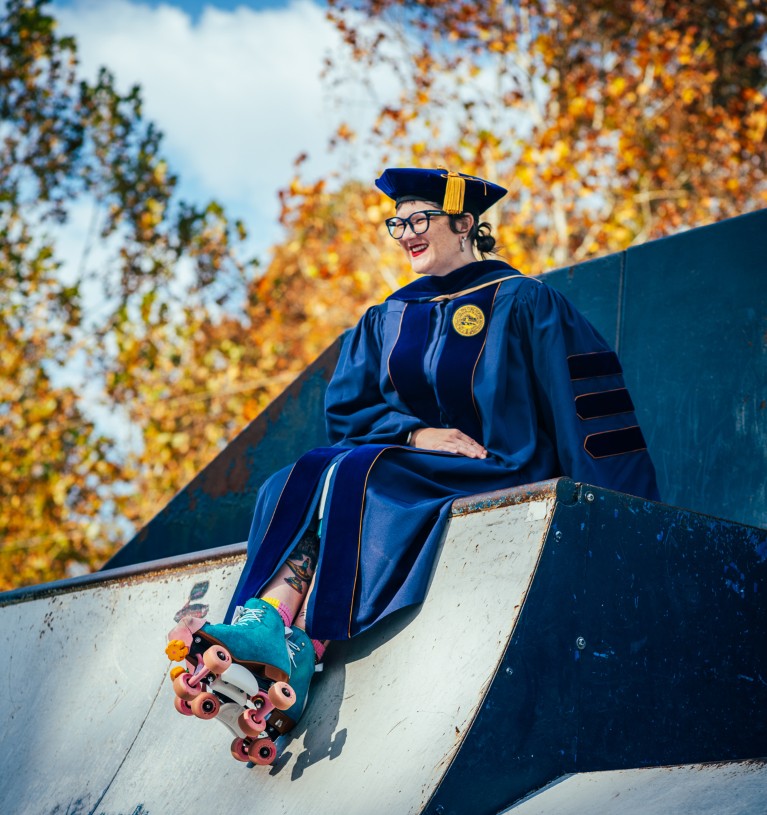
On a roll: Krista Bresock celebrates in her local skate park after graduating with a PhD in mathematics from West Virginia University, Morgantown, aged 41. Credit: Michael Germana
Krista Bresock sat crying in her professor’s office. She had to discuss one of five questions with her professor, in person. It was the concluding step of her final exam in functional analysis, the last course that she needed to complete for her PhD in mathematics. He’d shuffled a set of five cards, and she’d picked Card Number Two — corresponding to the one problem that she had not fully studied.
Unlike her fellow students studying intractable maths problems, Bresock was in her late thirties redoing coursework that she had failed years earlier. As a full-time maths teacher at West Virginia University (WVU) in Morgantown, she could find time to study only during nights and weekends.
“Problem Number Two was just collateral damage to being able to maintain this life of work full-time and be in grad school full-time,” Bresock remembers. She “fell to her knees” in relief when, a week later, she learnt she’d still got an A- in the course.
Many think of doctoral degrees as the domain of people in their twenties. Yet according to the US National Science Foundation, 17% of people who gained a PhD in science or engineering in the United States in 2022, the most recent year for which figures are available, were aged 36 or older . In some countries, including Colombia, Mexico, Portugal, South Korea, Iceland, Greece and Israel, the median age for entering a doctoral programme is 32 or higher, according to 2017 data from the OECD in Paris 1 .
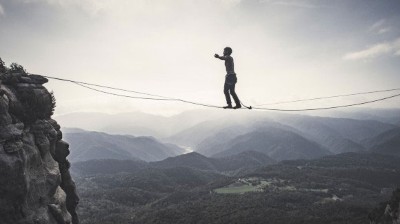
Resources for mid-career scientists
A PhD requires a vast commitment of time and energy, often lasting five or more years. Stipends, when available, are often lower than salaries for other full-time jobs or professions. What’s more, students might have to move to another city, or even a different country, to attend their chosen course. Although difficult for any age group, those constraints can create different challenges for prospective students in their thirties, forties and beyond than for their younger colleagues.
At the same time, age often brings wisdom and self-confidence, qualities that can help older students to cope with a strenuous academic life. “The extra ten years that I was out doing other things gave me a lot of perspective and maturity to the way in which I think and live, and I think that was a big reason why I’ve succeeded,” says Peter Swanton, a 36-year-old graduate student working towards a doctoral degree in astrophysics at the Australian National University in Canberra.
Motivation is key
For Bresock, a doctoral degree represented “unfinished business”. She had struggled with alcohol and drug addiction from the age of 16, but hit a dangerous low point in early 2013, when she was a graduate student at WVU the first time round. She dropped out and checked herself into an in-patient programme, but still drank heavily afterwards. With the support of friends, family and Alcoholics Anonymous, she became sober in July 2013.
Bresock then taught maths at WVU, first as an adjunct and then as a full-time instructor, but she didn’t forget her incomplete doctorate. Finally, at the age of 37, she re-enrolled. “This little voice was like, ‘You have more to say. You have more to do. You have this thing sitting on the back burner that is kind of eating away at you,’” she says.
Despite her drive to finish the degree, motivating herself was “really hard sometimes”, she says, “because if I didn’t finish, no one would care: I would just not finish and still have this job and be fine.” One of her top tips for others looking to pursue a doctorate in mid-life is to fully understand and reflect on their motivations. If the goal is “more money”, that might not be enough, she says.
Before returning to his studies, Swanton held a variety of jobs, including hauling sugar cane, working in nightclub security and tutoring in secondary schools. He has this advice for anyone who’s considering a doctorate: make sure you’re “doing it because you love it”. For him, that has meant finding ways to combine telescopic investigations of cosmic objects, such as active galactic nuclei, with preserving folklore about the cosmos from the Gamilaraay, the people of his Aboriginal culture.
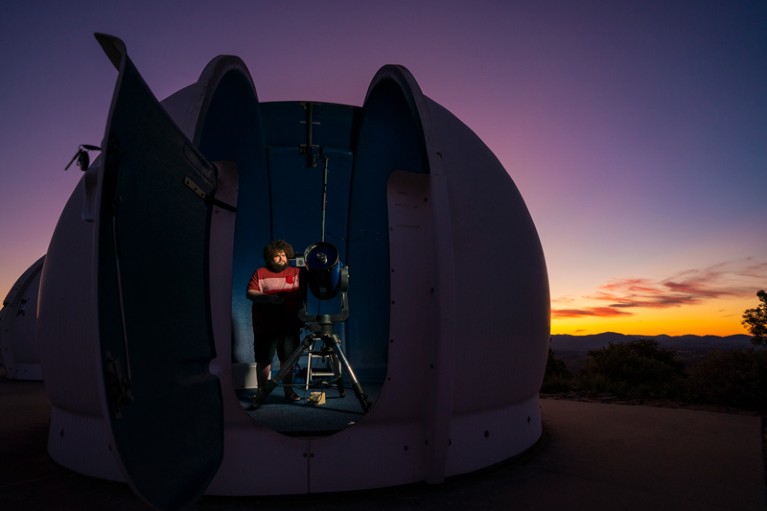
Peter Swanton, a 36-year-old graduate student in cultural astronomy at the Australian National University in Canberra, says that his previous work experience has given him the maturity to cope with the strains of academic life. Credit: Lannon Harley/ANU
Swanton’s heritage influences both his academic interests and the way in which he wants to communicate them. For example, the Gamilaraay language was originally a purely oral one. So, rather than just writing “a big block of text” for his dissertation, Swanton says that he would like to include elders and community members telling their own stories, and to bridge their knowledge with the Western understanding of the universe.
“My success has come down to finding something I am passionate about, and not concerning myself with future employability, which was the focus of my earlier attempts at academia and ultimately the reason why I didn’t succeed” at the time, he says.
Finding mentors
María Teresa Martínez Trujillo arrived at the Paris Institute of Political Studies to embark on a graduate programme in political science at the age of 32. Having spent her whole life up to that point in Mexico, she felt isolated from her classmates because of linguistic and cultural barriers, in addition to being the oldest student in her cohort. Martínez Trujillo had already had a career in the Mexican government, including working as an adviser to the secretary of the interior, yet she felt “less brave” than younger students, and had many more questions about reading materials.
She also felt ashamed about her lack of fluency in French. Over time, with the help of a therapist, she learnt to be less judgemental of herself and to overcome her impostor syndrome. Classmates helped her to proofread some of her assignments and she focused on improving her language skills.

Cultural and linguistic barriers left María Teresa Martínez Trujillo feeling isolated from her peers when she arrived from Mexico, aged 32, to embark on a graduate programme at the Paris Institute of Political Studies. Credit: Hiram Romero
Martínez Trujillo’s advisers — Hélène Combes and Gilles Favarel-Garrigues — were key for her as she dived into reading and fieldwork on the relationship between drug trafficking and the business world in Morelia, Mexico, for her master’s project. “They let me go to the ‘forest’ and spend time and lose myself,” she says, adding that when she felt lost or stuck, her advisers helped her to find her way.
Time and money
Finances often pose a problem for graduate students who don’t already have savings and support, including those who have worked previously. Even with tuition covered, and a stipend to help towards living expenses, making ends meet can be challenging, especially for students who have other financial responsibilities, such as providing for family members or maintaining a home.
Martínez Trujillo received a stipend, but she spent almost all of it on rent and didn’t want to ask her family for money. She worked as a nanny, consulted for a Mexican think tank and spent summers working in Mexico on friends’ projects. “I’d never have free days,” she says.
Bresock wishes she could have spent more time away from both work and studies. “I did a terrible job of that. Make sure you make time for yourself. That dissertation will still be there, if you go take a walk, or if you go swim or whatever, for an hour out of your life.”
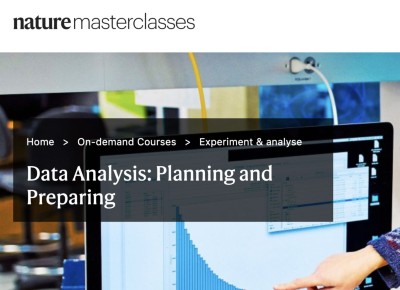
Training: Data Analysis: Planning and Preparing
Like Bresock, Marc Gentile kept a full-time job while doing his PhD in astrophysics at the Swiss Federal Institute of Technology in Lausanne in his mid-to-late-fortiess. He needed to earn enough to support both himself and his wife, and to address other financial responsibilities.
“The top advice would be establishing effective work and study habits right from the start,” he says. “In my case, time was the most precious resource, and I had to be very well organized to make the most of it.”
Gentile would work on his doctoral assignments from 5 a.m. to 6 a.m. each weekday, before leaving for his day job. He would then read articles while commuting by train, and tackle more PhD tasks or further reading in the evenings. “I was told that I was, on average, more productive and better organized than most other, younger students, because you develop such skills when you work professionally,” he said.
Family matters
When Wendy Bohon walked across the stage to receive her doctorate in geology, she was nearly 38 years old and pregnant with twins. She wound up at Arizona State University in Tempe after beginning her career as an actor, and then becoming fascinated with earthquakes after one shook her apartment in 1999.
For her dissertation, Bohon conducted fieldwork in India on two large fault systems, focusing on how fast they had been moving, their intersections and their frequency of earthquakes — as well as the growth of mountains around them — over the past 34 million years. Today, she heads the Seismic Hazards and Earthquake Engineering branch of the California Geological Survey in Sacramento.
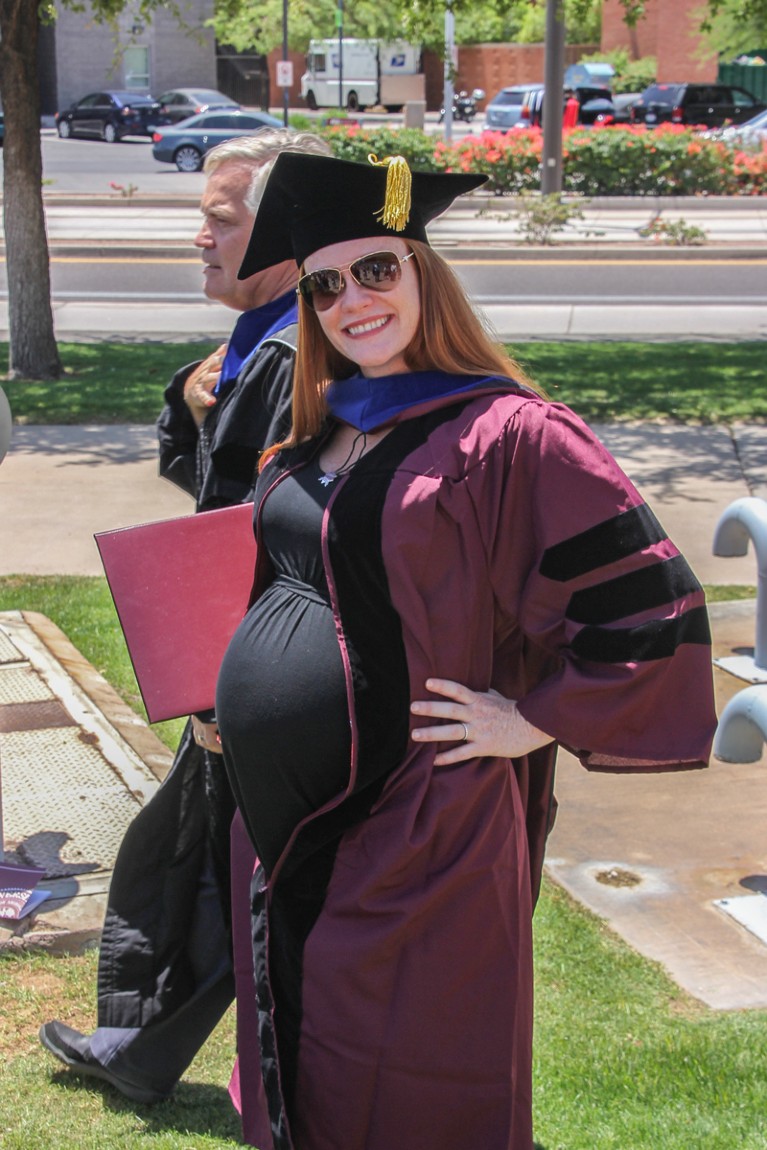
Wendy Bohon was nearly 38, and pregnant with twins, when she graduated from Arizona State University in Tempe with a PhD in geology. Credit: Linda Bohon
As a student, her desire to expand her family had put her in a different life stage from younger peers. She had met her husband, who already had a young daughter, while in her graduate programme. And whereas her classmates had wanted to avoid pregnancy, she had struggled to conceive. “That emotional disconnect and the difference in their reality and my reality — it was really tough,” she says. Ultimately, she and her husband chose to try the intensive process of in vitro fertilization, which Bohon mostly kept secret. At the same time, she was helping to co-parent her husband’s daughter, and the couple were given full custody of the girl when she was seven.
Bohon coped with parenting and finishing graduate school with the help of “a built-in village of people around who could step in to help us”. Other graduate students would play the card game UNO with the girl, or colour pictures with her. And Bohon’s mentor, along with the mentor’s husband, became the child’s godparents.
“In a lot of ways, it was easier to parent during my PhD, because my schedule was relatively flexible, so I could stay home with her when she was sick, or attend school functions,” Bohon says. What’s more, she adds, “having a kiddo that needed me helped me to set and keep healthier boundaries than I think I would have otherwise”.
Charlotte Olsen, a postdoctoral researcher in astrophysics at the New York City College of Technology, earned a PhD at the age of 42 and now investigates the factors that influence star formation and galaxy evolution. Olsen says that working on her doctorate presented challenges for her marriage. “I’m not gonna lie: grad school is really rough on a relationship,” she says — adding that, especially at the beginning, “it’s an incredibly stressful time”.
Among the responsibilities that older students might have is taking care of ageing parents. Olsen recalls that during her qualifying exams, she hadn’t heard from her mother, who was 76 years old at the time, for a while. She assumed that her mother wanted to give her space during that stressful time. Later, she found out that her mother’s appendix had ruptured, necessitating surgery and a stay in a hospital’s intensive-care unit.
Through it all, Olsen’s spouse was an invaluable source of emotional support. “Having somebody who is there with you along the way” helps a lot, she says.
What happens next?
Not everyone who gets a PhD stays in their field. Gentile, now 60, works as a data scientist for a Swiss television station. He had a postdoctoral research position for five years after graduation — but for several reasons, including financial ones, he could not find an academic job afterwards. “If I had really wanted to continue in astrophysics, then I would have had to move abroad; it’s difficult now,” he says.
Still, Gentile found the PhD experience rewarding and worthwhile. As well as acquiring problem-solving techniques, he learnt coding and data-science skills, such as machine learning and statistical methods. And he has used all of these in subsequent jobs, including his current one.
His graduate work also remains relevant. Some of the algorithms and software that he worked on during his PhD helped to inform the tools that scientists will use to analyse data from the European Space Agency’s Euclid observatory, which aims to explore dark energy and dark matter.
Bresock received a promotion at West Virginia University after earning her PhD in maths in December 2022, aged 41. Her dissertation examined how students understand the definite integral, a fundamental concept in calculus, when solving different kinds of problem.
Today, she has greater empathy for her own students because of her own struggles as a graduate student. Finishing her doctorate remains one of her most satisfying accomplishments, she says. “When people ask me what’s the biggest thing I’ve ever done in my life, it’s: get sober, and then, finish my PhD. That’s a close second.”
doi: https://doi.org/10.1038/d41586-024-02109-x
Organisation for Economic Co-operation and Development. Education at a Glance 2019: OECD Indicators (OECD, 2019).
Download references
Related Articles

- Research management

How to network with the brightest minds in science
Career Feature 26 JUN 24

What it means to be a successful male academic
Career Column 26 JUN 24

Is science’s dominant funding model broken?
Editorial 26 JUN 24

The strategy behind one of the most successful labs in the world
Comment 26 JUN 24

How I’m using AI tools to help universities maximize research impacts
World View 26 JUN 24
Assistant Professor (Tenure Track) of Biomolecular Engineering for Health
The Department of Biosystems Science and Engineering (D-BSSE) (www.bsse.ethz.ch) at ETH Zurich invites applications for the above-mentioned position
Zurich, Switzerland
Suzhou Institute of Systems Medicine Seeking High-level Talents
Full Professor, Associate Professor, Assistant Professor
Suzhou, Jiangsu, China
Suzhou Institute of Systems Medicine (ISM)
Faculty Positions in Westlake University
Founded in 2018, Westlake University is a new type of non-profit research-oriented university in Hangzhou, China, supported by public a...
Hangzhou, Zhejiang, China
Westlake University
2024-2025 Westlake Fellowship Applications Open
A Quick Career Path from Fresh PhD to Faculty
Hangzhou, Zhejiang (CN)
Postdoctoral Research Associate - USC Center for Genetic Epidemiology
A postdoctoral research fellow position is available in the lab of Dr. Charleston Chiang at USC.
Los Angeles, California
University of Southern California - Center for Genetic Epidemiology
Sign up for the Nature Briefing newsletter — what matters in science, free to your inbox daily.
Quick links
- Explore articles by subject
- Guide to authors
- Editorial policies
- Search Please fill out this field.
- Manage Your Subscription
- Give a Gift Subscription
- Newsletters
- Sweepstakes
Ph.D. Student Visiting Friend During School Break Is Accused of Murdering Baby, Abusing Slain Child's Twin
Nicole Virzi is charged with criminal homicide
Allegheny County Jail; Isabella Kahhale and Sam Plate/GoFundMe
A Ph.D. student is accused of murdering an infant boy and abusing his twin brother while babysitting for a family friend in Pittsburgh.
Nicole Virzi, 29, is pursuing a doctorate in San Diego. She was staying in Pittsburgh at the time of the baby’s death, according to reports from The San Diego Union-Tribune , WTAE and WPXI .
Virzi was arrested on June 16 and has been charged with criminal homicide, three counts of aggravated assault and one count of endangering the welfare of a child, according to court records. She has been denied bail and is due for a preliminary hearing on June 28.
Citing the criminal complaint, WTAE reported that Virzi was babysitting newborn Leon Katz while his parents brought his twin brother to the hospital after she had informed them about injuries to the baby’s genital area.
The Union-Tribune, citing the same complaint, reported that before the baby was taken to the hospital, Virzi had allegedly been alone with the child.
After Leon was left in Virzi’s care so his parents could take their other son to the hospital, Leon suffered an ultimately fatal skull fracture, according to the reported complaint.
WTAE reported that a doctor who examined the twins told police that the injuries they suffered were consistent with child abuse and “not accidental,” according to the complaint.
Want to keep up with the latest crime coverage? Sign up for PEOPLE's free True Crime newsletter for breaking crime news, ongoing trial coverage and details of intriguing unsolved cases.
Virzi’s defense attorney David Schrager told the Union-Tribune that his client did not commit a crime and said the baby fell out of a bouncing chair while she was out of the room.
“We are at the beginning of our investigation, but it’s important to note that my client has no criminal history whatsoever,” Shrager said, according to the paper. “She is a Ph.D. student and was a longtime friend of the family.”
According to her bio page on the school’s website, Virzi is pursuing a Ph.D. in clinical psychology at San Diego State University and UC San Diego.
A GoFundMe started to benefit Leon’s family referred to Virzi as a “trusted family friend.” So far it has raised over $60,000.
If you suspect child abuse, call the Childhelp National Child Abuse Hotline at 1-800-4-A-Child or 1-800-422-4453, or go to www.childhelp.org. All calls are toll-free and confidential. The hotline is available 24/7 in more than 170 languages.
Katie Steele & Tiffany Brown, PhD: "The Price She Pays"

From body shaming to abuse, Katie Steele and Tiffany Brown, PhD, know how damaging competitive sports can be to the well-being of women, and they hope their new book will change that. The co-authors of "The Price She Pays" joined us to share more. Join Katie and Tiffany at the following book event:
- "The Price She Pays: Confronting the Hidden Mental Health Crisis in Women's Sports - from the Schoolyard to the Stadium"
- Katie Steele & Tiffany Brown, PhD, in Conversation with Jenny Nguyen
- Thursday, June 27
- Powell’s Books at Cedar Hills Crossing
- For more information click here
Katie and Tiffany host the podcast "Sports Shrinks". Click here to get there .
- About the Show
- eng.umd.edu
- Faculty Directory
- Staff Directory
- ECE Ph.D. Student Yingjie Li Named Rising Star...
ECE Ph.D. Student Yingjie Li Named Rising Star by ML Commons
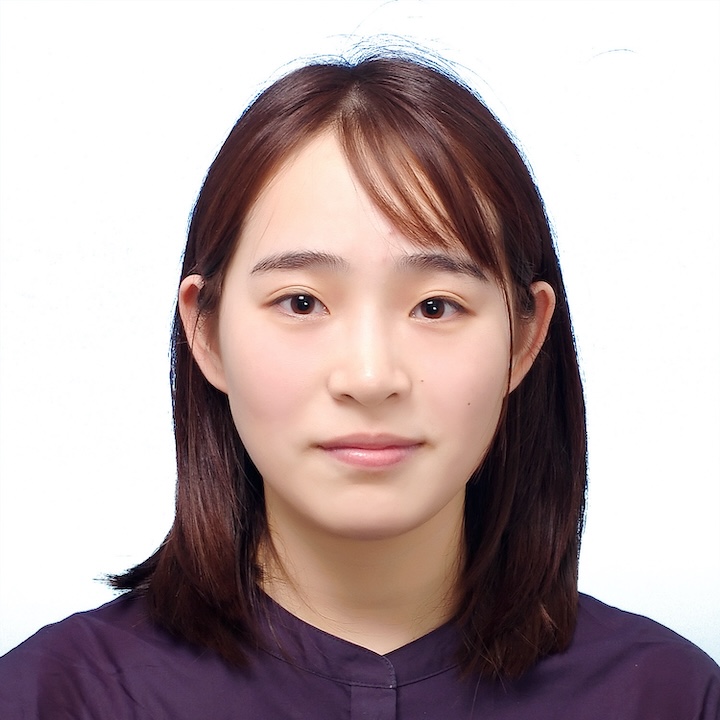
ECE Ph.D. student Yingjie Li has been named a 2024 ML and Systems Research Rising Star from ML Commons . She is one of 41 students from 33 global institutions chosen for this honor. Recipients are chosen based on their demonstration of excellence in Machine Learning (ML) and Systems research.
ML Commons is an artificial intelligence engineering consortium focused on collaboration between industry and academia in building and improving AI systems that will benefit society. It will host the 2024 Rising Stars Workshop at the NVIDIA headquarters in Santa Clara, CA in July, providing a platform for young researchers working at the intersection of ML and systems.
Li earned a B.S. from Huazhong University of Science and Technology in China and a MS from Cornell University. Her research interests include physics-aware infrastructure for optical computing platforms, hardware-software co-design and efficient AI/ML algorithms, as well as electronic design automation (EDA) with a focus on machine learning for synthesis and verification. She is advised by Professor Cunxi Yu.
Other awards recently received are the Best Paper Award from the Design Automation Conference (DAC) 2023, American Physical Society Division of Laser Science (DLS) Poster Award 2022, and second place at the 2023 Association for Computing Machinery Special Interest Group in Design Automation (ACM/SIGDA) Student Research Competition. She was named an EECS Rising Star in 2023.
Published June 26, 2024
Recent Stories
Stories / Jun 26, 2024
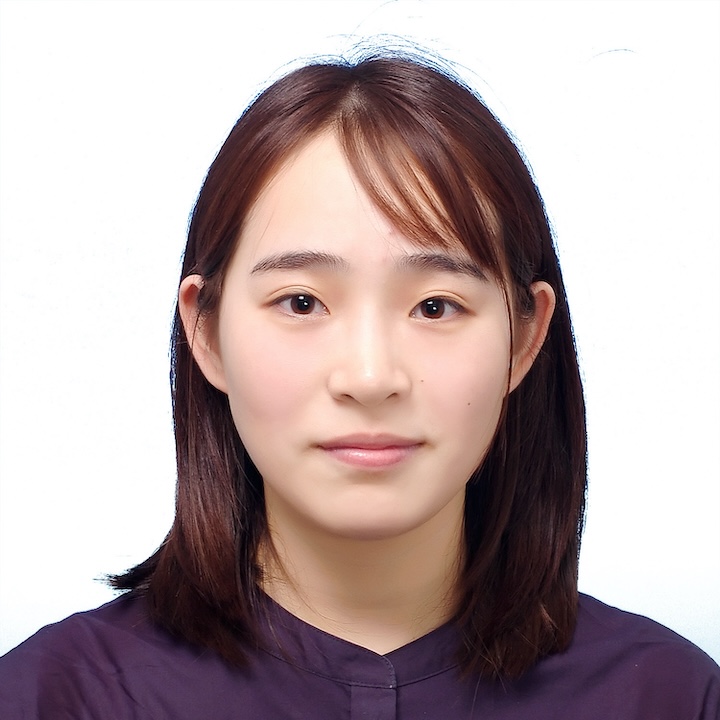
Stories / Jun 24, 2024
MPEL Students Win Best Student Paper Award

Stories / Jun 21, 2024
New Photonic Chip Spawns Nested Topological Frequency Comb

Stories / Jun 18, 2024
Maryland Engineering: Top 10 Among Public Graduate Programs,...

Stories / Jun 12, 2024
Forty years of MEMS research at the Hilton Head Workshop
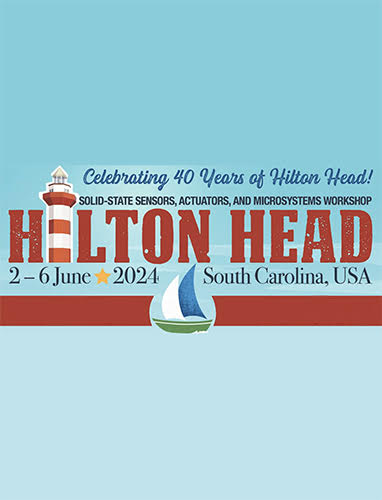
Stories / Jun 10, 2024
Baturalp Buyukates (ECE Ph.D. ’21) Honored by IEEE ComSoc

Teaching Students Specialized Skills for Success
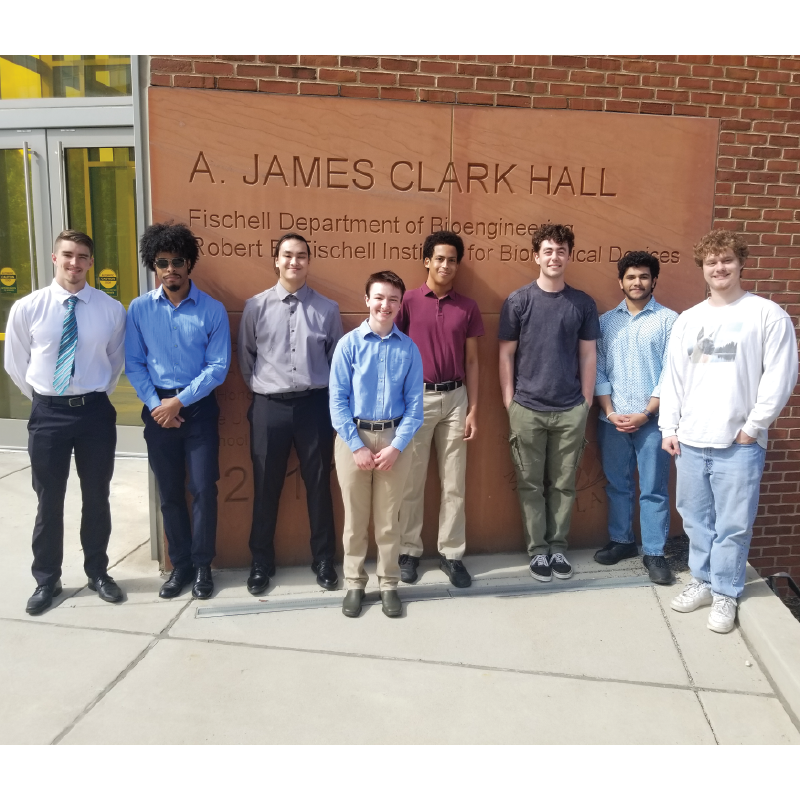
Stories / Jun 5, 2024
ECE/ISR Ph.D. Students Win Hardware Demo Competitions in HOST...
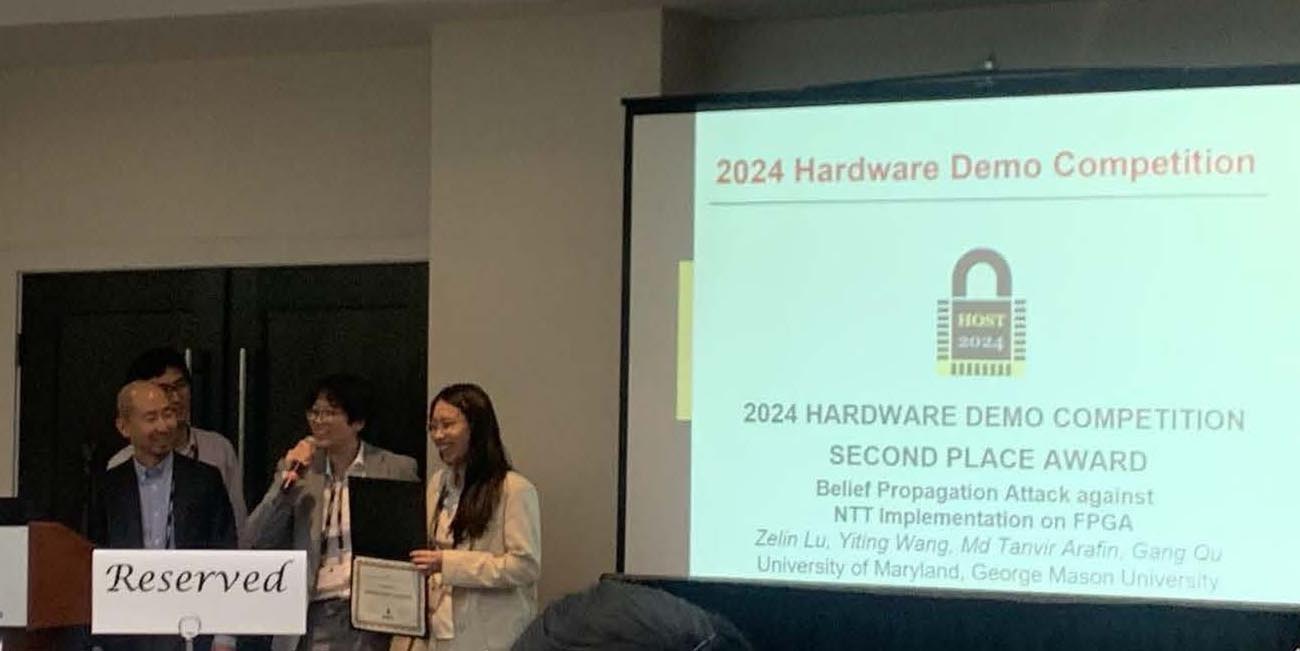
Stories / Jun 3, 2024
Innovating in Engineering Education: Join Us at the 2024 ASEE...
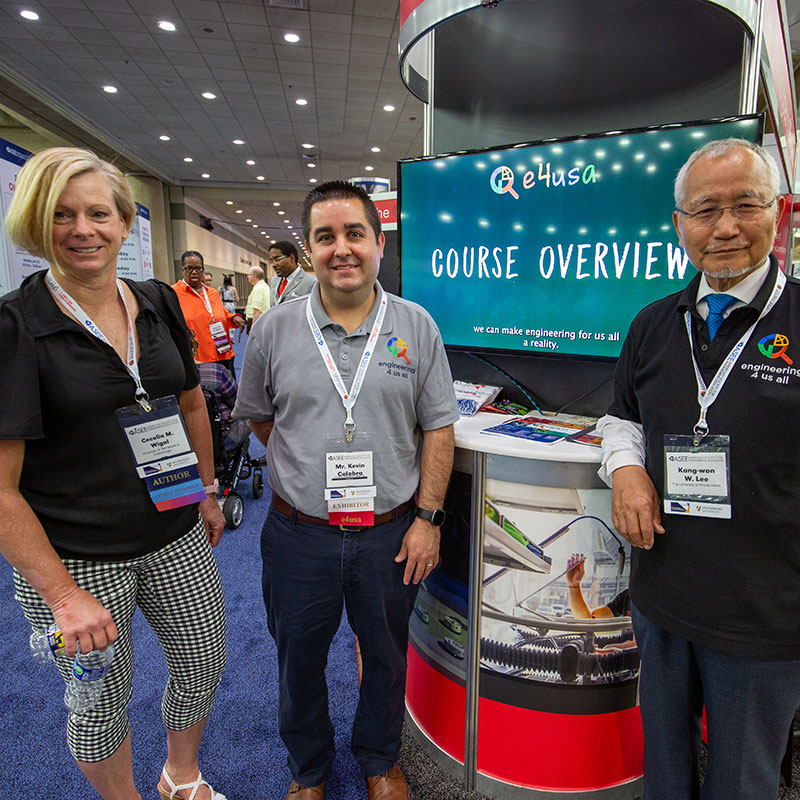
Kevin Daniels and Cheng Gong Promoted to Associate Professor...

We’re fighting to restore access to 500,000+ books in court this week. Join us!
Internet Archive Audio

- This Just In
- Grateful Dead
- Old Time Radio
- 78 RPMs and Cylinder Recordings
- Audio Books & Poetry
- Computers, Technology and Science
- Music, Arts & Culture
- News & Public Affairs
- Spirituality & Religion
- Radio News Archive

- Flickr Commons
- Occupy Wall Street Flickr
- NASA Images
- Solar System Collection
- Ames Research Center

- All Software
- Old School Emulation
- MS-DOS Games
- Historical Software
- Classic PC Games
- Software Library
- Kodi Archive and Support File
- Vintage Software
- CD-ROM Software
- CD-ROM Software Library
- Software Sites
- Tucows Software Library
- Shareware CD-ROMs
- Software Capsules Compilation
- CD-ROM Images
- ZX Spectrum
- DOOM Level CD

- Smithsonian Libraries
- FEDLINK (US)
- Lincoln Collection
- American Libraries
- Canadian Libraries
- Universal Library
- Project Gutenberg
- Children's Library
- Biodiversity Heritage Library
- Books by Language
- Additional Collections

- Prelinger Archives
- Democracy Now!
- Occupy Wall Street
- TV NSA Clip Library
- Animation & Cartoons
- Arts & Music
- Computers & Technology
- Cultural & Academic Films
- Ephemeral Films
- Sports Videos
- Videogame Videos
- Youth Media
Search the history of over 866 billion web pages on the Internet.
Mobile Apps
- Wayback Machine (iOS)
- Wayback Machine (Android)
Browser Extensions
Archive-it subscription.
- Explore the Collections
- Build Collections
Save Page Now
Capture a web page as it appears now for use as a trusted citation in the future.
Please enter a valid web address
- Donate Donate icon An illustration of a heart shape
Hello from Poulenc, Vol 12, No 158, June 2024
Audio with external links item preview.

Share or Embed This Item
Flag this item for.
- Graphic Violence
- Explicit Sexual Content
- Hate Speech
- Misinformation/Disinformation
- Marketing/Phishing/Advertising
- Misleading/Inaccurate/Missing Metadata

plus-circle Add Review comment Reviews
Download options, in collections.
Uploaded by joyofhex on June 16, 2024
SIMILAR ITEMS (based on metadata)
- Education & Teaching
- Schools & Teaching

Sorry, there was a problem.

Download the free Kindle app and start reading Kindle books instantly on your smartphone, tablet, or computer - no Kindle device required .
Read instantly on your browser with Kindle for Web.
Using your mobile phone camera - scan the code below and download the Kindle app.

Image Unavailable

- To view this video download Flash Player
Follow the author

The Power of a PhD: How Anyone Can Use Their PhD to Get Hired in Industry Paperback – September 13, 2022
What if all your years of hard work in academia finally paid off?
Imagine never having to work in another dead-end academic position, or being able to tell the world you are in a leadership position within a thriving company. PhDs are in demand in industry, but often, these PhDs are invisible to potential employers. Dr. Isaiah Hankel, leverages his expertise as the CEO of the world's largest career training platform for PhDs, Cheeky Scientist, to help PhDs overcome their biggest obstacle: obscurity.
The Power of a PhD is the stepwise blueprint that 18 million PhDs worldwide are seeking. Dr. Isaiah Hankel’s eight core steps within The Power of a PhD include:
- Industry career options for PhDs
- Communicating the right skills
- Writing industry résumés
- Mastering LinkedIn profiles
- Networking and job referrals
- Generating informational interviews
- Acing industry interviews
- Negotiating your salary
This eight-step approach provides a consistent and proven methodology that allows PhDs to transition into industry without suffering the painful process of trial and error.
You could be the next PhD hired at Amazon, Google, Apple, Intel, Dow Chemical, BASF, ERM, Merck, Genentech, Nestle, Hilton, Tesla, Syngenta, Siemens, the CDC, UN or Ford Foundation!
- Print length 276 pages
- Language English
- Publisher Morgan James Publishing
- Publication date September 13, 2022
- Dimensions 6 x 0.75 x 9 inches
- ISBN-10 1631958461
- ISBN-13 978-1631958465
- See all details
Editorial Reviews
“If you’re a PhD struggling to get hired...you absolutely need this book!” - Camillia Smith Barnes, PhD, Google
“A revolutionary book for both beginners and industry-experienced PhDs looking for change!” - Elisa Maria Guimarães de Souza, PhD, Johnson & Johnson“PhDs
“PhD’s beware, after reading this book, there’s no excuse for not taking proven steps to achieve the career you desire.” - Ralph Hazlewood, PhD, Regeneron
About the Author
Dr. Isaiah Hankel is the Founder and CEO of Cheeky Scientist, the largest career training platform for PhDs in the world. His articles, podcasts and trainings are consumed annually by 3 million PhDs in over 150 different countries. He has helped PhDs transition into top companies like Amazon, Google, Apple, Intel, Dow Chemical, BASF, Merck, Genentech, Home Depot, Nestle, Hilton, SpaceX, Tesla, Syngenta, the CDC, UN and Ford Foundation. Dr. Hankel has published two bestselling business books on career transitions and his methods for getting PhDs hired have been featured in the Harvard Business Review, Nature, Forbes, The Guardian, Fast Company, Entrepreneur Magazine and Success Magazine. He currently runs Cheeky Scientist in Miramar Beach, Florida, where he lives with his wife and two daughters.
Product details
- Publisher : Morgan James Publishing (September 13, 2022)
- Language : English
- Paperback : 276 pages
- ISBN-10 : 1631958461
- ISBN-13 : 978-1631958465
- Item Weight : 14.4 ounces
- Dimensions : 6 x 0.75 x 9 inches
- #201 in Career Development Counseling
- #274 in Vocational Guidance (Books)
- #643 in Job Hunting (Books)
Videos for this product

Click to play video

Customer Review: Beautiful work with brilliant insights.
Philip Adeyemi ADENIYI
About the author
Isaiah hankel.
Dr. Isaiah Hankel’s books have been translated into multiple languages and have hit #1 on bestseller’s lists world-wide, and #1 in multiple Amazon categories. His third book, THE POWER of a PhD, is set to release in September, 2022. His first book, Black Hole Focus, debuted as #1 in business non-fiction in the UK, and his second book, The Science of Intelligent Achievement, was chosen as the top Blinkist pick of the month.
He received his doctorate in Anatomy & Cell Biology with a focus in immunology and is an expert on personal development and career development. His work has been featured in the Harvard Business Review, Nature, Forbes, The Guardian, Fast Company, Entrepreneur Magazine and Success Magazine.
Dr. Hankel has delivered corporate presentations to over 100,000 people, including over 1,000 workshops and keynotes in over 50 countries worldwide. His courses and training programs have been purchased and used by hundreds of thousands of professionals in over 150 countries. Over three million people read Dr. Hankel’s articles and listen to his podcasts every year.
He grew up working on a sheep farm in the Pacific Northwest of the US before going on to get his doctorate. He went on to become the founder and CEO of Cheeky Scientist, living in Germany, the UK, and Australia before returning to the states.
Customer reviews
Customer Reviews, including Product Star Ratings help customers to learn more about the product and decide whether it is the right product for them.
To calculate the overall star rating and percentage breakdown by star, we don’t use a simple average. Instead, our system considers things like how recent a review is and if the reviewer bought the item on Amazon. It also analyzed reviews to verify trustworthiness.
Reviews with images

- Sort reviews by Top reviews Most recent Top reviews
Top reviews from the United States
There was a problem filtering reviews right now. please try again later..
Top reviews from other countries
- About Amazon
- Investor Relations
- Amazon Devices
- Amazon Science
- Sell products on Amazon
- Sell on Amazon Business
- Sell apps on Amazon
- Become an Affiliate
- Advertise Your Products
- Self-Publish with Us
- Host an Amazon Hub
- › See More Make Money with Us
- Amazon Business Card
- Shop with Points
- Reload Your Balance
- Amazon Currency Converter
- Amazon and COVID-19
- Your Account
- Your Orders
- Shipping Rates & Policies
- Returns & Replacements
- Manage Your Content and Devices
- Conditions of Use
- Privacy Notice
- Consumer Health Data Privacy Disclosure
- Your Ads Privacy Choices
University of South Florida
Main Navigation

Breath of fresh air: PhD student's mission to improve post-COVID-19 respiratory health
- Tiffani Torres
- June 25, 2024
Four years after the start of the coronavirus pandemic, individuals are still suffering from the lasting effects of the virus. PhD student, Sandra Morgan is dedicated to researching COVID-19's effects on the respiratory system and exploring ways for individuals to strengthen it.

Before starting at the USF College of Nursing, Morgan worked in critical care nursing and executive leadership roles. For nearly a decade, she served as the chief nursing officer at HCA Florida. Morgan also maintained various leadership positions at a critical illness recovery hospital. While becoming a researcher was always on her bucket list, observing patients in acute and post-acute settings struggle with the negative effects of COVID-19 prompted her to start the PhD program at USF.
“The pandemic really changed my perspective. It made me feel like now is the time,” says Morgan. “I thought to myself, maybe there is something more that I can do to improve patient care.”
Upon entering the PhD program, Morgan had the opportunity to participate in a COVID-19 respiratory study with Constance Visovsky, PhD, RN, ACNP, FAAN, as her faculty advisor. She found the experience inspiring, and with the help of Dr. Visovsky and others, Morgan created the protocol that serves as the foundation of her current study.
In her 12-week study, participants complete inspiratory and expiratory exercises aimed at improving weakness in the breathing muscles caused by the COVID-19 virus. Participants have seen improvements in their respiratory systems, and Morgan has noted interest from other communities, such as runners, seeking to improve their breathing ability.
Morgan’s Pulmonary Rehabilitation Research Study for individuals recovering from COVID-19 is still seeking participants.

Eligibility: - Age 18 or older - Self-reported history of Covid-19 - Able to walk independently - Short of breath
Compensation: Participants will receive a $25 gift certificate to Publix upon completing six- and twelve-week milestones.
For more information, reach out to Sandra Morgan at [email protected].
Return to article listing
Explore More Categories
- Student Success
About Department News
USF Health College of Nursing News highlights the great work of our trailblazing faculty, staff, and students! The College of Nursing is an integral part of USF Health and the University of South Florida. USF Health College of Nursing -- Where Nursing Trailblazers Belong!

IMAGES
VIDEO
COMMENTS
20 Best PhD Degree Books of All Time - BookAuthority. The 20 best phd degree books recommended by Paul Bloom, Sam Wineburg and Alison Gopnik, such as The New PhD and Next Gen PhD.
11 books between $8 and $35 that will boost your productivity, writing output and decision-making throughout your grad school and research career. This is the start of your journey in becoming your best self and improving your chances of landing that dream job after graduation.
If you want a bit more of the conceptual basis behind the book, read this earlier post on why a thesis is a bit like an avatar. 4. The unwritten rules of PhD research by Marian Petre and Gordon Rugg. I love this book because it recognises the social complexities of doing a PhD, without ever becoming maudlin.
The bulk of the book focuses on preparing for jobs in academia, but it also provides information on leaving academia and finding other ways to utilize the PhD. The book is broken down into ten parts covering everything those looking at the tenure-track need to know, including types of academic institutions (R1/SLACs/R2/etc.), job market ...
A Europe-based computational scientist turned entrepreneur, Dr. Bielczyk offers an important perspective on PhD careers, one explicitly aimed at STEM folks. The book benefits from Bileczyk's personal experiences, extensive research — including interviews with dozens of PhDs — and includes lots of specific advice and suggestions.
Next Gen PhD brings together all that is needed for a scientist to embark on his or her career journey, whether in academia or beyond.-- Laura Stark, Harvard University An important book that is long overdue. Next Gen PhD displays broad experience and command of the most critical steps in the transition from academic researcher to working ...
The Ph.D. Process offers the essential guidance that students in the biological and physical sciences need to get the most out of their years in graduate school. Drawing upon the insights of numerous current and former graduate students, this book presents a rich portrayal of the intellectual and emotional challenges inherent in becoming a scientist, and offers the informed, practical advice a ...
"A fresh update to a true classic. This is one of the most reassuring and useful books you will ever read about doing your PhD, no matter your topic - or where you are enrolled."Professor Inger Mewburn, Director of Researcher Development, Office of the Dean of Higher Degree by Research, The Australian National University, Canberra, Australia"How to get a PhD is both honest and thorough ...
Take a look at The PhD Viva: How to Prepare for Your Oral Examination by Peter Smith. There are lots of great books out there about the viva. However, Peter Smith's extensive experience puts his at the top of our list. Having sat in over 100 viva examinations as a chair, examiner and supervisor in a range of subjects it's safe to say that ...
"Mastering your PhD" helps guide PhD students through their graduate student days. Filled with practical advice on getting started, communicating with your supervisor, staying the course, and planning for the future, this book is a handy guide for graduate students who need that extra bit of help getting started and making it through. Every year, thousands of students around the world embark ...
By Alex Wakeman. Let's be honest. If you're nerdy enough to be doing a PhD, you probably love a good book. Whether you're looking for entertainment or advice, distraction or comfort, the seven listed here can each, in their own way, help you through your frustrating but uniquely rewarding life of a PhD student. Isaac Asimov - I, Robot.
4. Playing the Game: The Streetsmart Guide to Graduate School, Frederick Frank & Karl Stein. If you're looking for a realistic, down to brass tacks guide to going to graduate school, this is for you. Both Frank and Stein graduated from prestigious doctoral programs, and used their combined experience in publishing, researching, conference ...
This bestselling book on the process of PhD research provides readers with engaging discussion and comprehensive guidance on aspects that other books don't usually mention. Covering all the key topics of the previous edition, including what a PhD is really about, how to do one well, how to decipher what your supervisor actually means by terms ...
The book shares an effective daily habit, tips on making consistent writing inevitable, managing incomplete research, leveraging advisor meetings, and seeking active help from friends. A game-changer for those struggling with time constraints in their doctoral journey. 5. The Dissertation Warrior, by Guy E. White.
Buy at Bookshop.org. The Secret Thoughts of Successful Women by Valerie Young. Imposter syndrome is a common struggle of graduate and Ph.D. students (especially women and BIPOC students) — the pervasive feelings of inadequacy and that you don't deserve your success.
avg rating 3.94 — 247 ratings — published 2009. Want to Read. Rate this book. 1 of 5 stars 2 of 5 stars 3 of 5 stars 4 of 5 stars 5 of 5 stars. Books shelved as phd: The Unwritten Rules of Ph.D. Research by Gordon Rugg, How to Write a Lot: A Practical Guide to Productive Academic Writing by Paul ...
The majority of the book is relevant to the PhD and since it's only $9.95 on Kindle you might want to start with this instead and upgrade to the more expensive paperback if you think you want more. My introduction to Barbara Kamler and Pat Thomson's "Helping doctoral students to write: pedagogies for supervision" was quite different.
1. Building a Successful Career in Scientific Research: A Guide for PhD Students and Postdocs by Phil Dee. Phil Dee wrote about life as a scientist since 2000 as a columnist for Science's Next Wave. This book is a fast and entertaining read, that focuses on tips and quick wins to help you move your career forward. 2.
2. Mastering Your PhD: Survival and Success in the Doctoral Years and Beyond. This book can help a student in getting started with their PhD thesis. It also guides them in terms of planning ahead. It concentrates on the key skills that could help students in achieving their goals. 3. Advice for a Young Investigator.
Mastering your PhD, by Patricia Gosling and Bart Noordam. Very readable book with good advice and a nice set of fictitious running case studies. Authoring a PhD, by Patrick Dunleavy. A formal, but very well written and readable book, dedicated exclusively to writing the thesis. As far as thesis writing goes, this is a definitive guide. Bonus ...
The book has good advice, and again, I'd recommend reading it to a new PhD student (not really for MA students, which is really the new BA) with the understanding that academia is, presently, fucking bullshit and fucks students six ways to Sunday.
A PhD requires a vast commitment of time and energy, often lasting five or more years. Stipends, when available, are often lower than salaries for other full-time jobs or professions.
A Ph.D. student is accused of murdering an infant boy and abusing his twin brother while babysitting for a family friend in Pittsburgh. Nicole Virzi, 29, is pursuing a doctorate in San Diego. She ...
The final third of the book focuses specifically on writing a dissertation or thesis, building on earlier ideas in the book. The book suffers from a handful of editing mishaps - an irony considering Hayton's insistence on relatively careful writing and the editing process - and it was much less comprehensive than other books in this genre.
From body shaming to abuse, Katie Steele and Tiffany Brown, PhD, know how damaging competitive sports can be to the well-being of women, and they hope their new book will change that. The co ...
Rev. Dr. Robert G. Stephanopoulos, PHD, passed away at the age of 89 on June 19, 2024 after a lifetime of service to the Greek Orthodox Church. Just last year, his beloved wife, Presvytera Nikki fell asleep in the Lord. Father and Presvytera were known and admired across the country, making an impact in every community they served.
ECE Ph.D. Student Yingjie Li Named Rising Star by ML Commons. ECE Ph.D. student Yingjie Li has been named a 2024 ML and Systems Research Rising Star from ML Commons.She is one of 41 students from 33 global institutions chosen for this honor.
We're fighting to restore access to 500,000+ books in court this week. Join us! A line drawing of the Internet Archive headquarters building façade. ... 2024, KIT Tyabandha, PhD . Online journal Hello from ..., ISSN 2042-8871, volume 12, number 158. Addeddate 2024-06-16 19:47:37 Collection_added journals
- Camillia Smith Barnes, PhD, Google "A revolutionary book for both beginners and industry-experienced PhDs looking for change!" - Elisa Maria Guimarães de Souza, PhD, Johnson & Johnson"PhDs "PhD's beware, after reading this book, there's no excuse for not taking proven steps to achieve the career you desire."
PhD student, Sandra Morgan is dedicated to researching COVID-19's effects on the respiratory system and exploring ways for individuals to strengthen it. Before starting at the USF College of Nursing, Morgan worked in critical care nursing and executive leadership roles. For nearly a decade, she served as the chief nursing officer at HCA Florida.